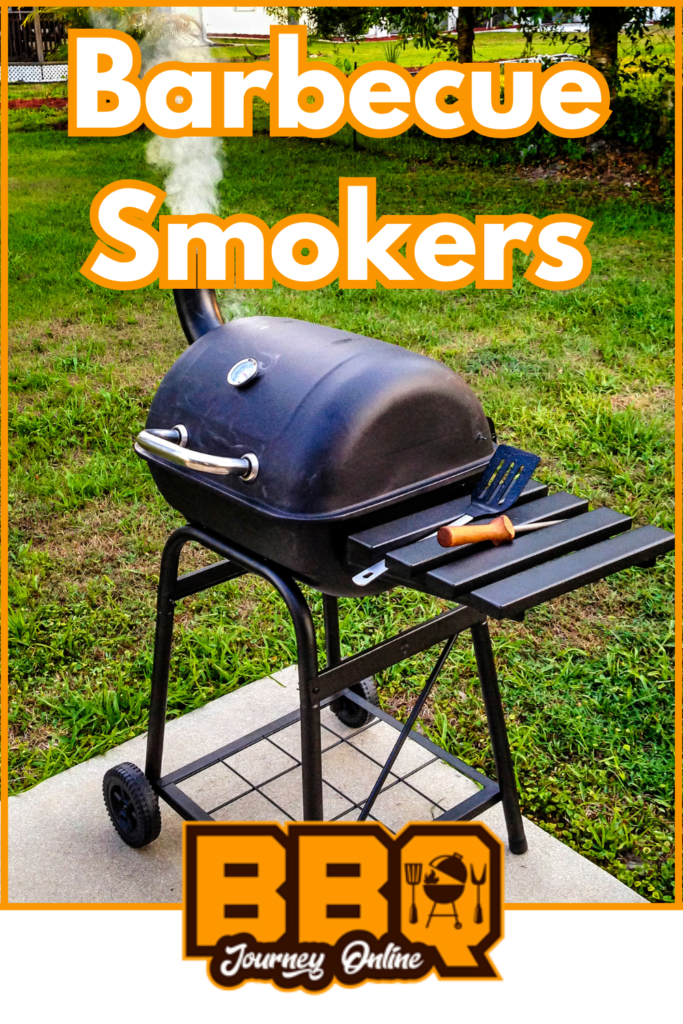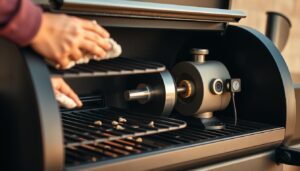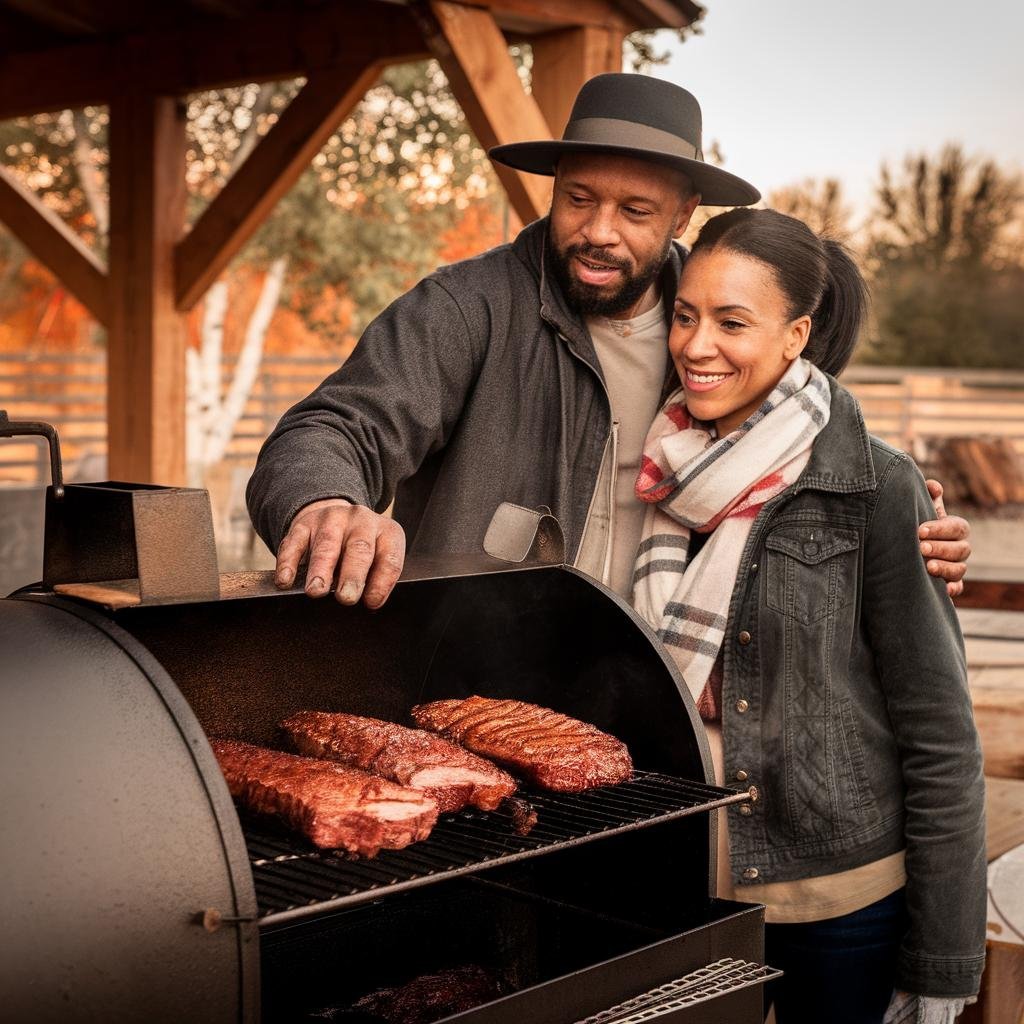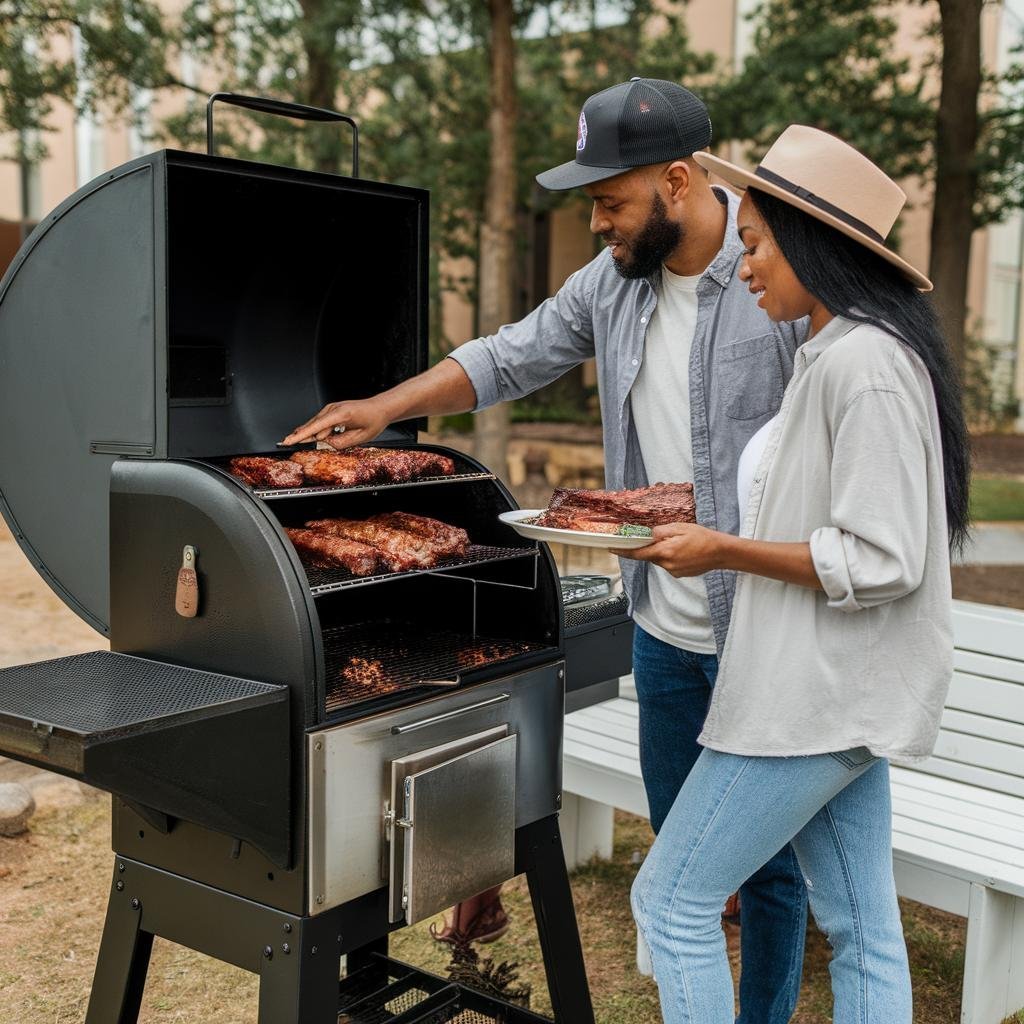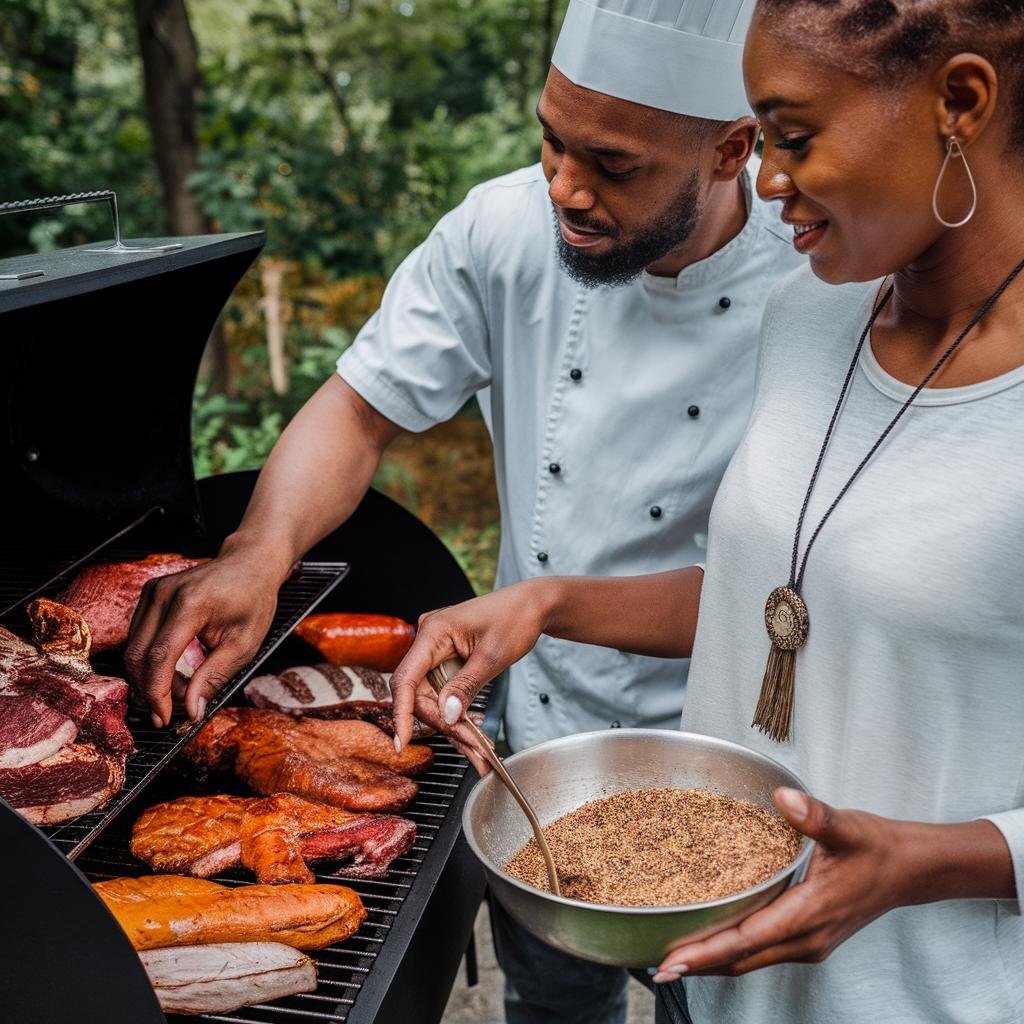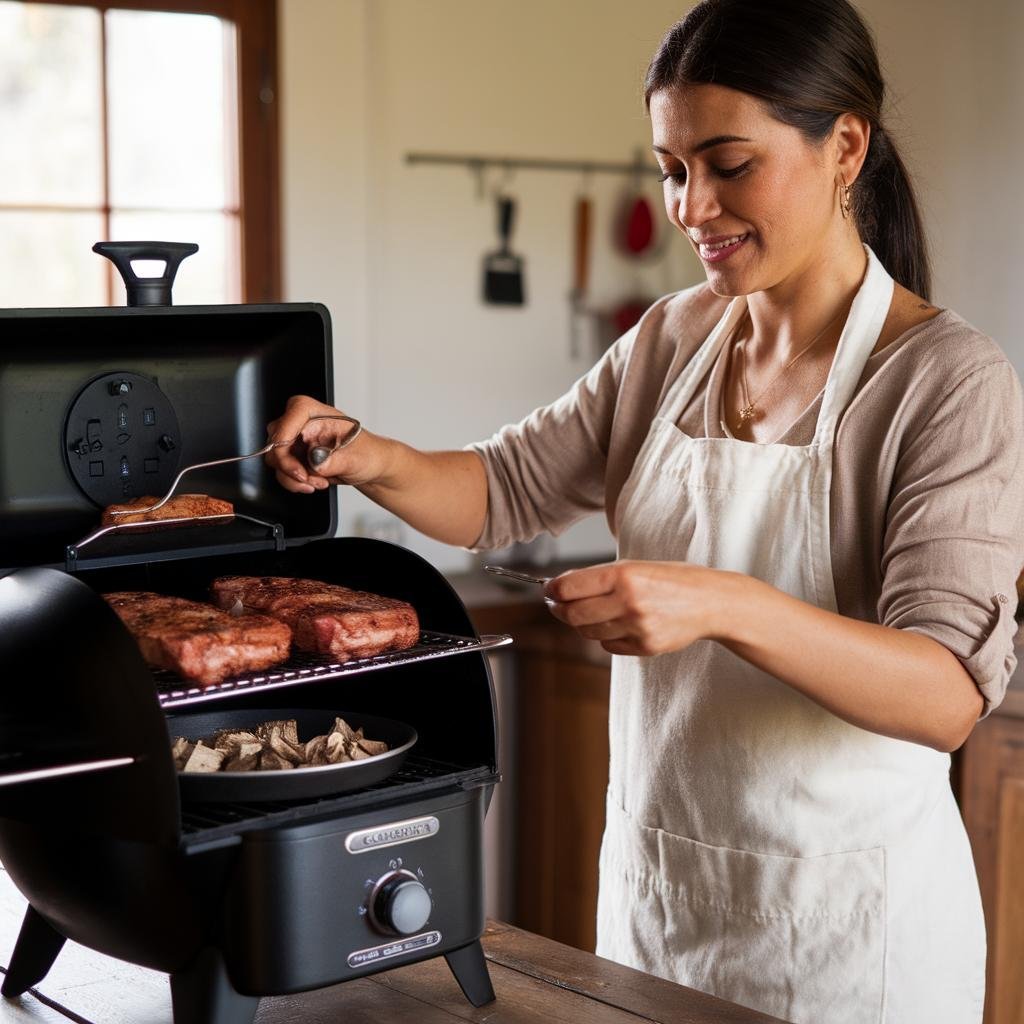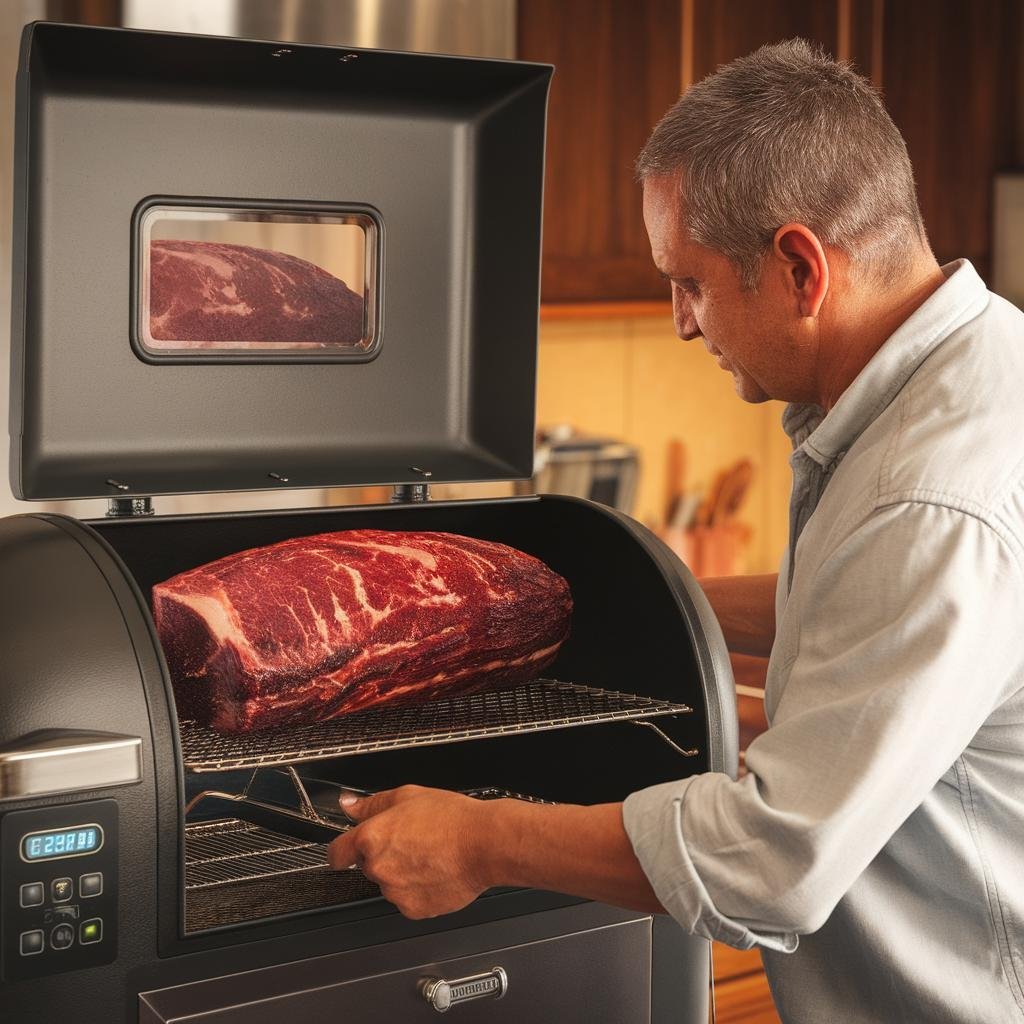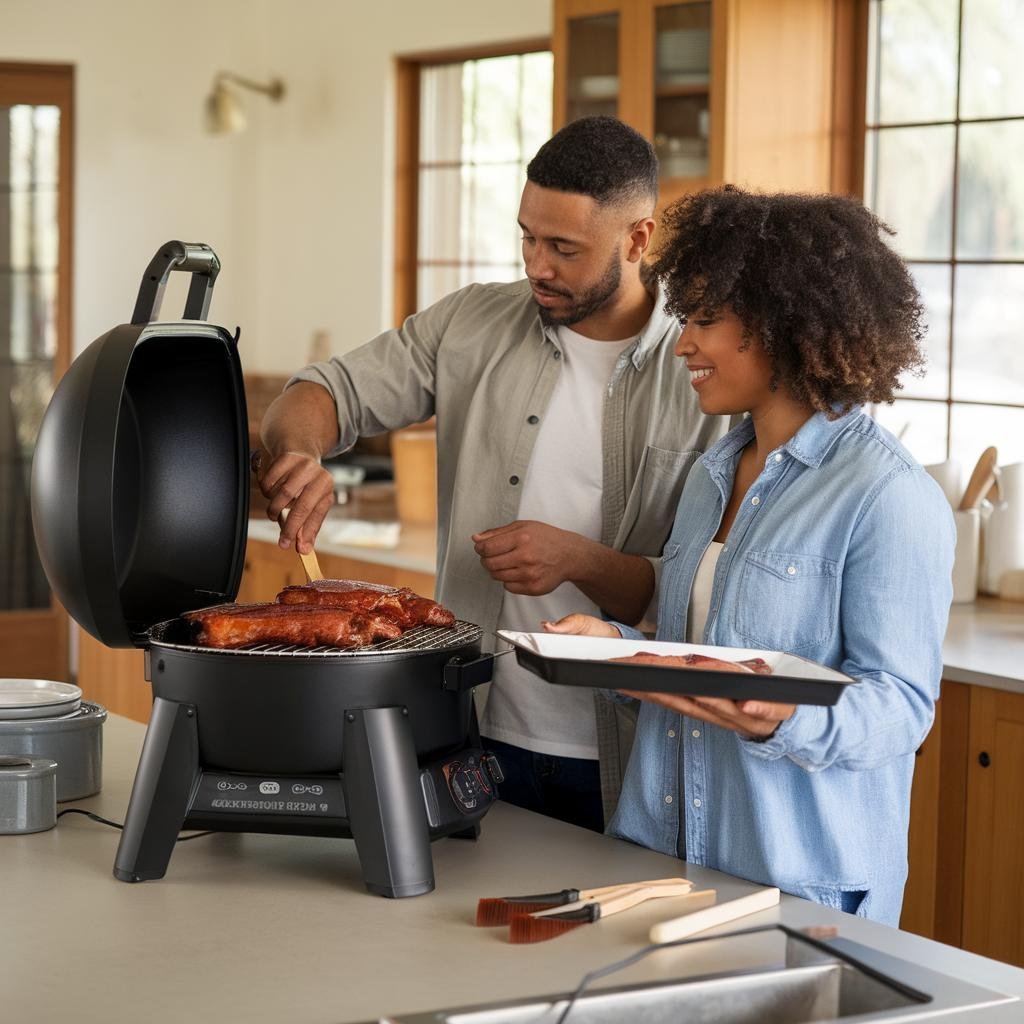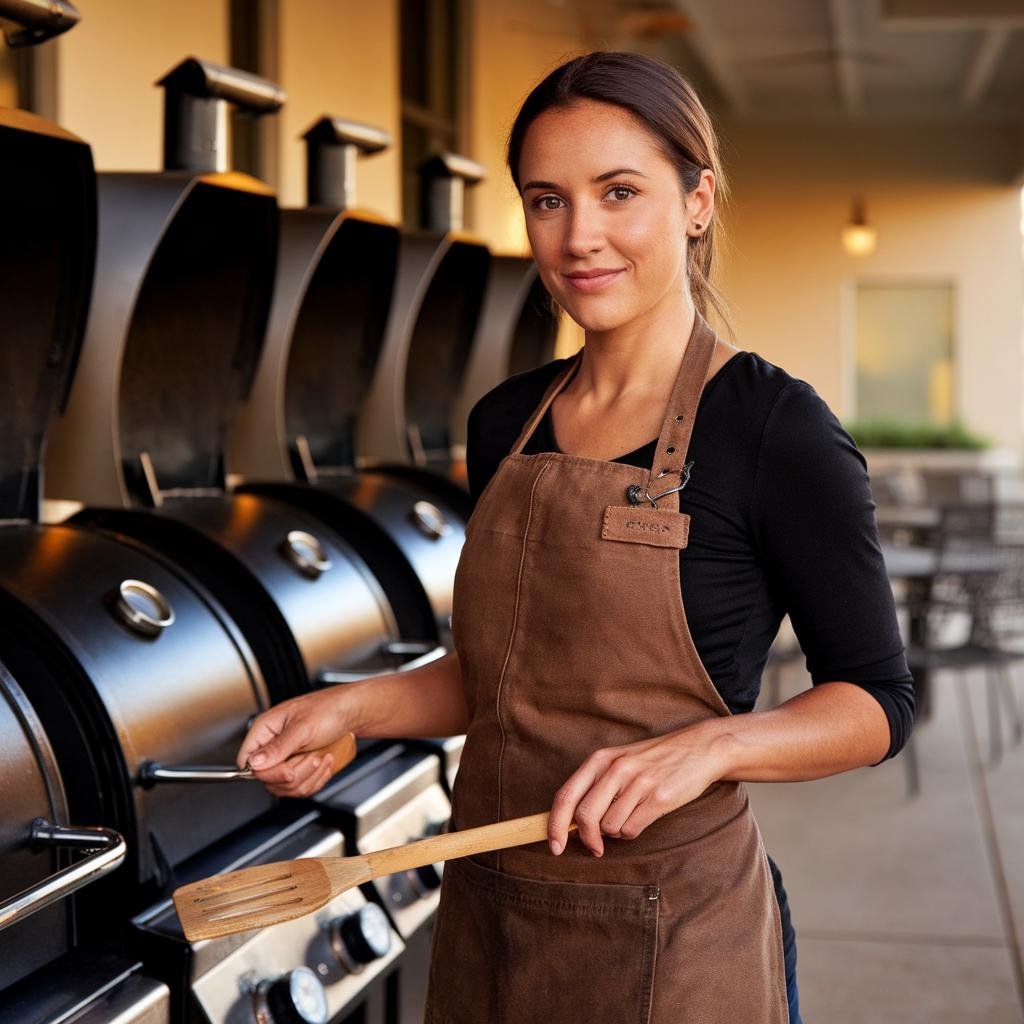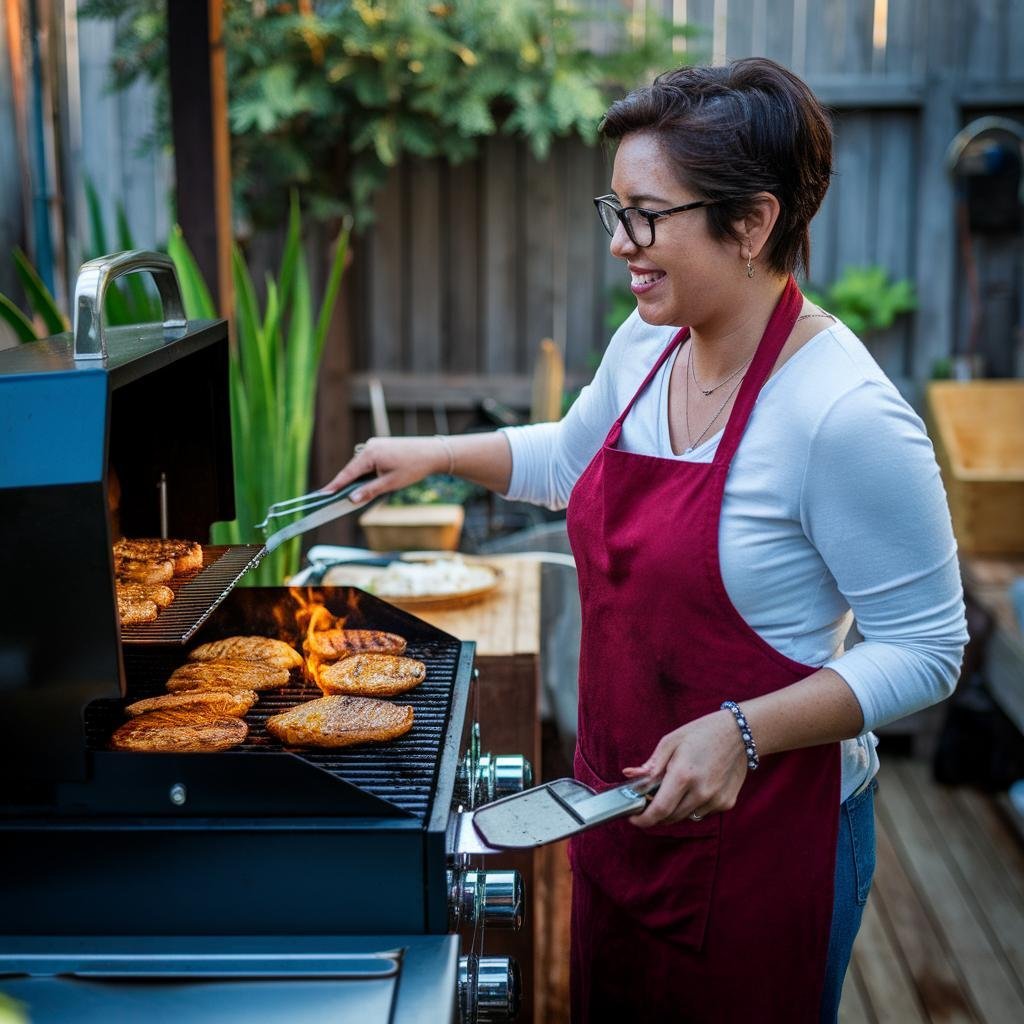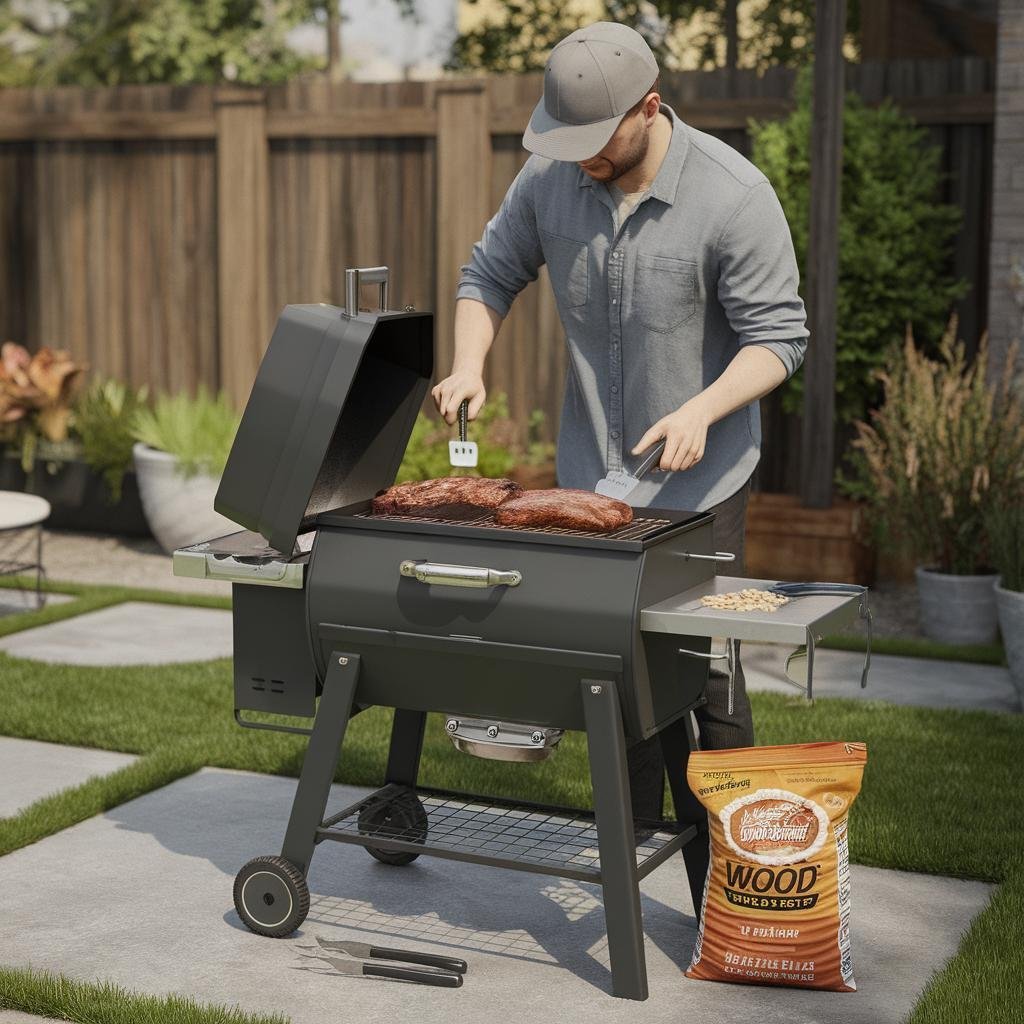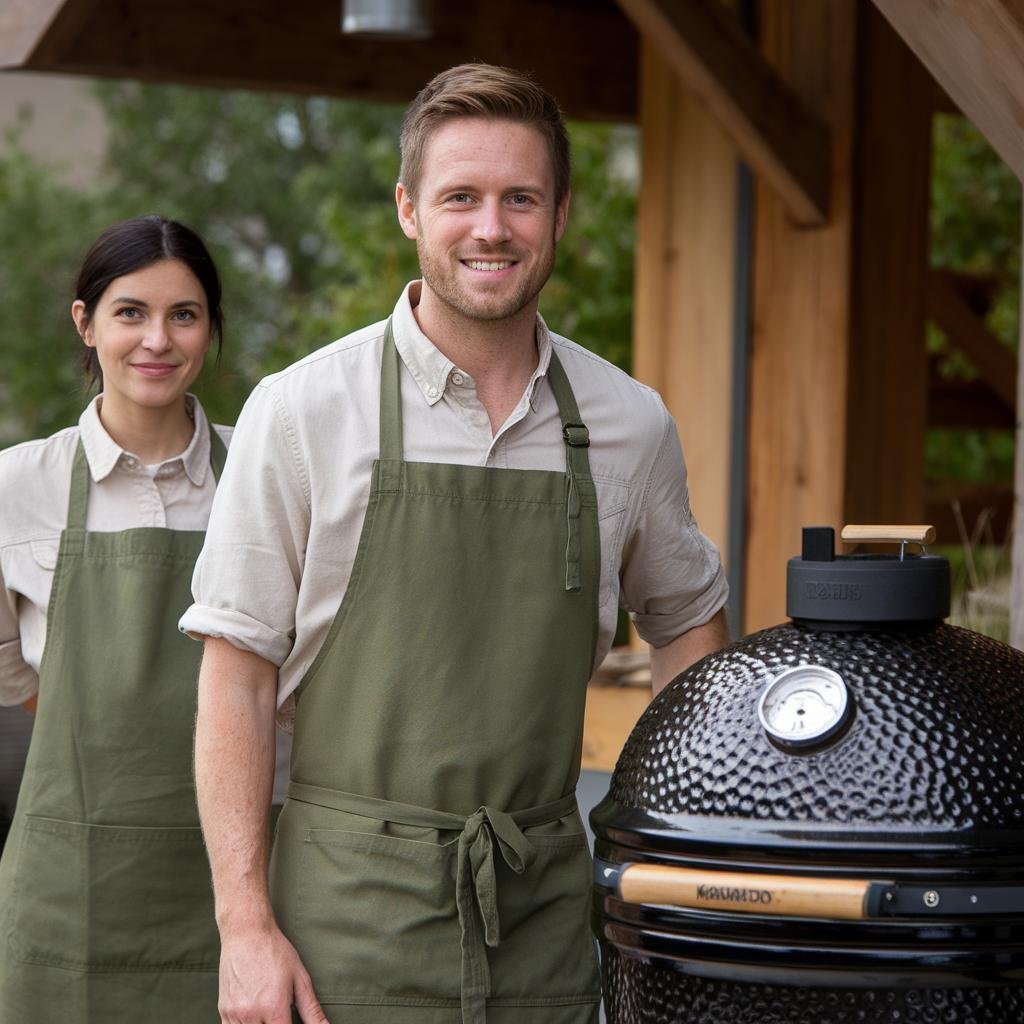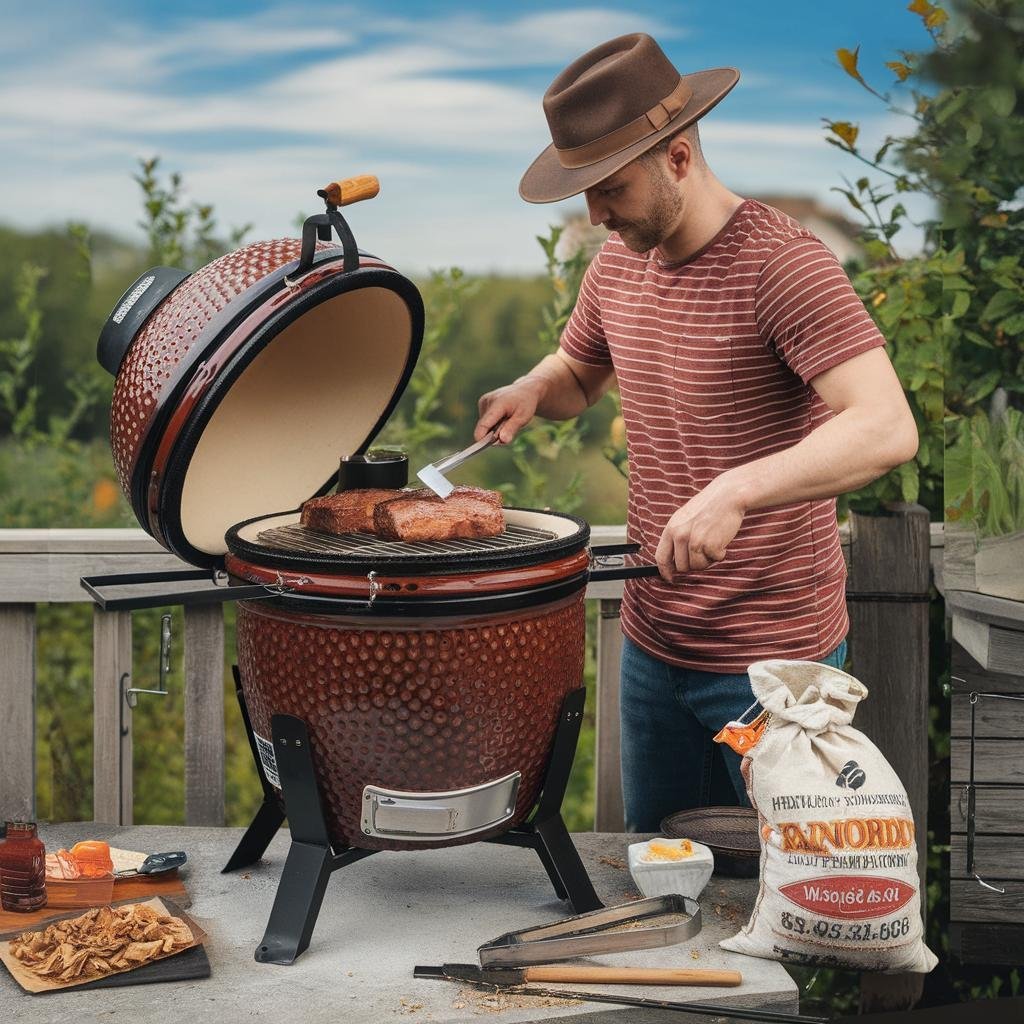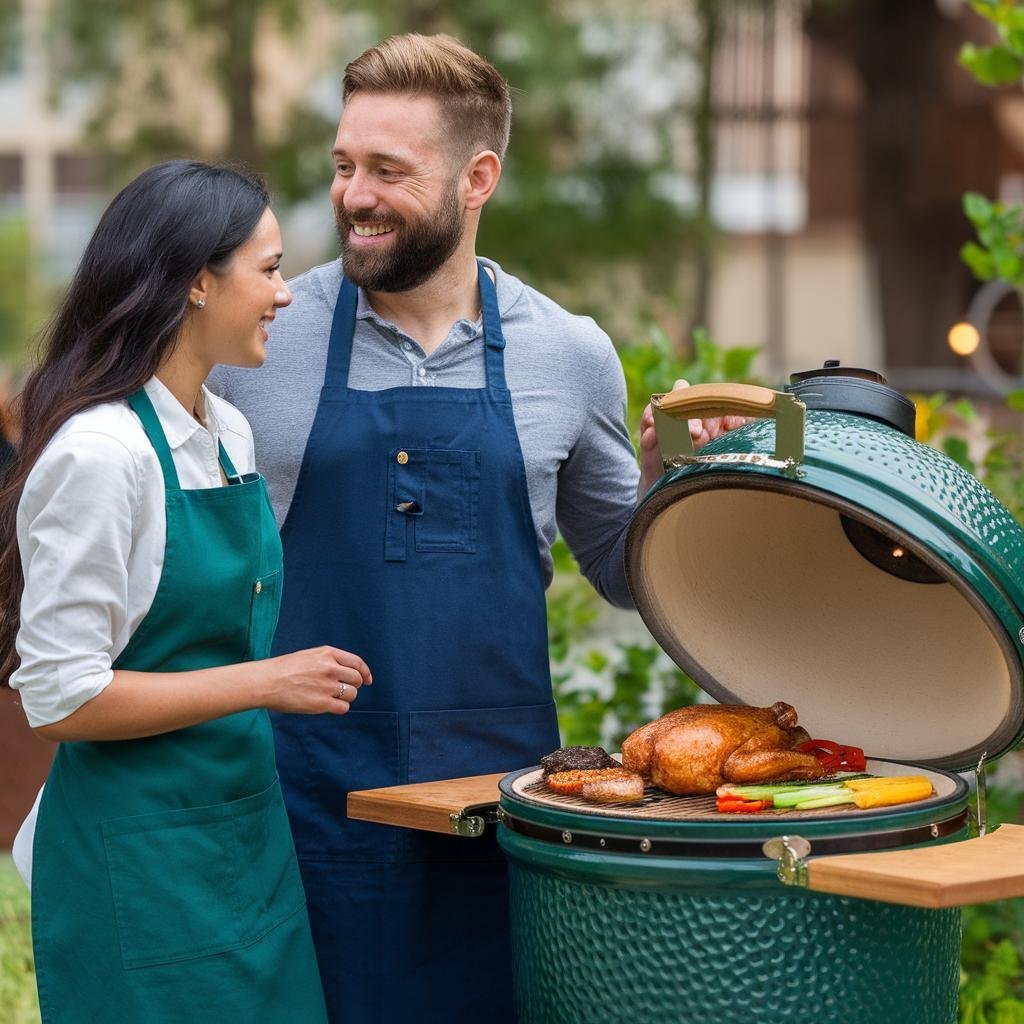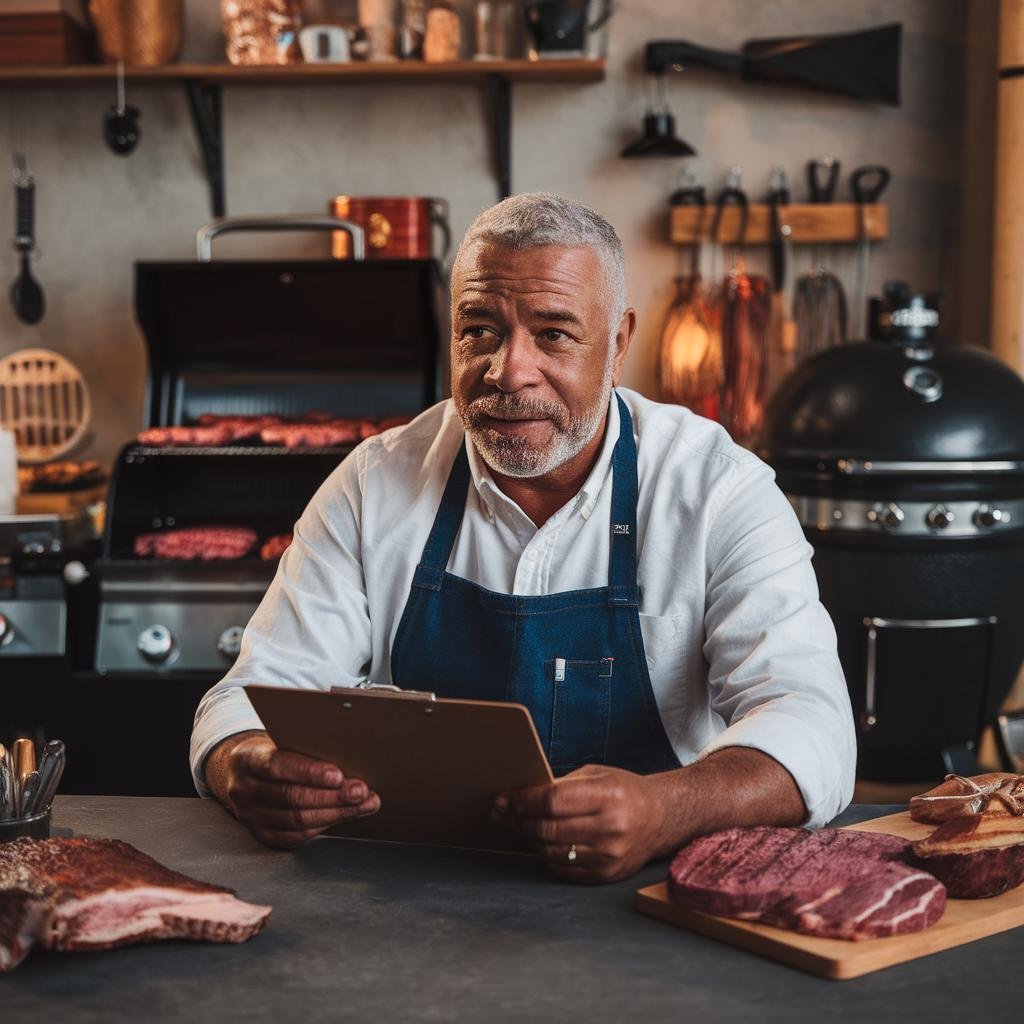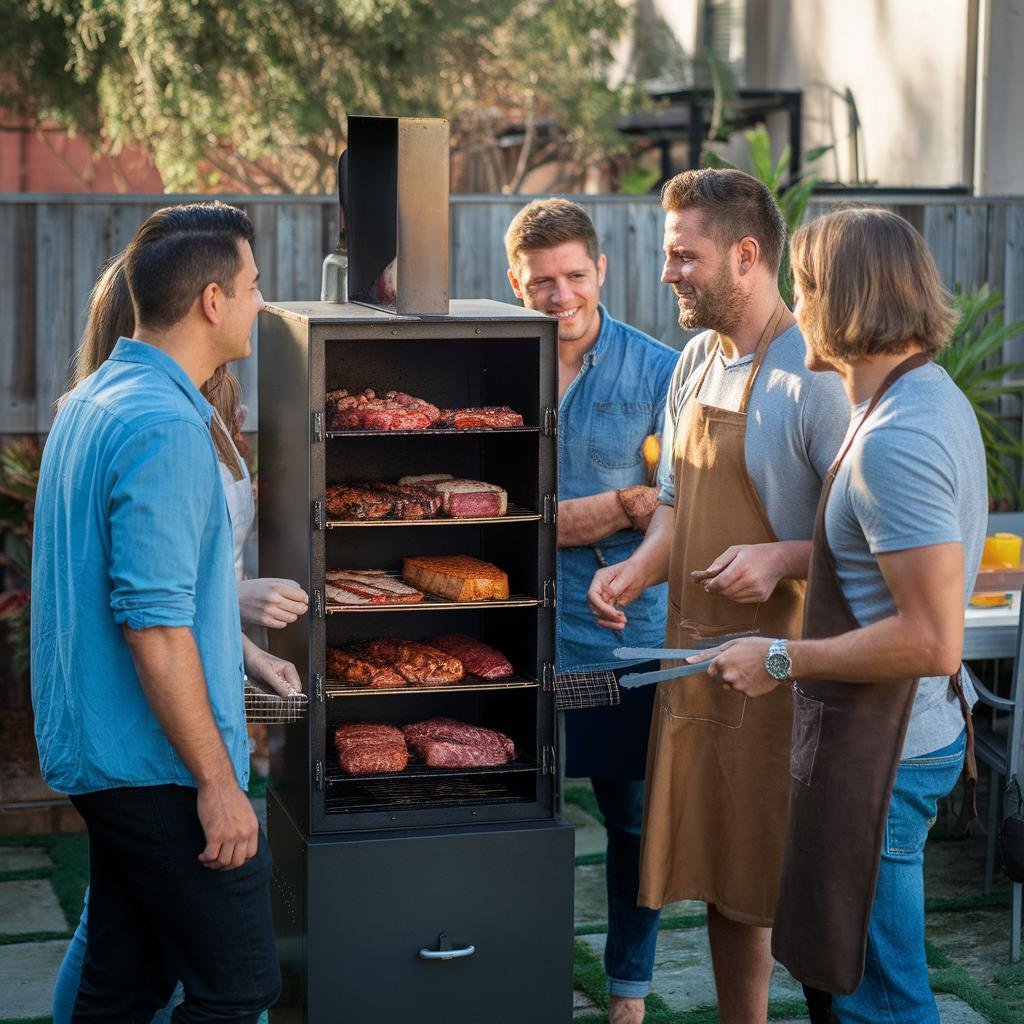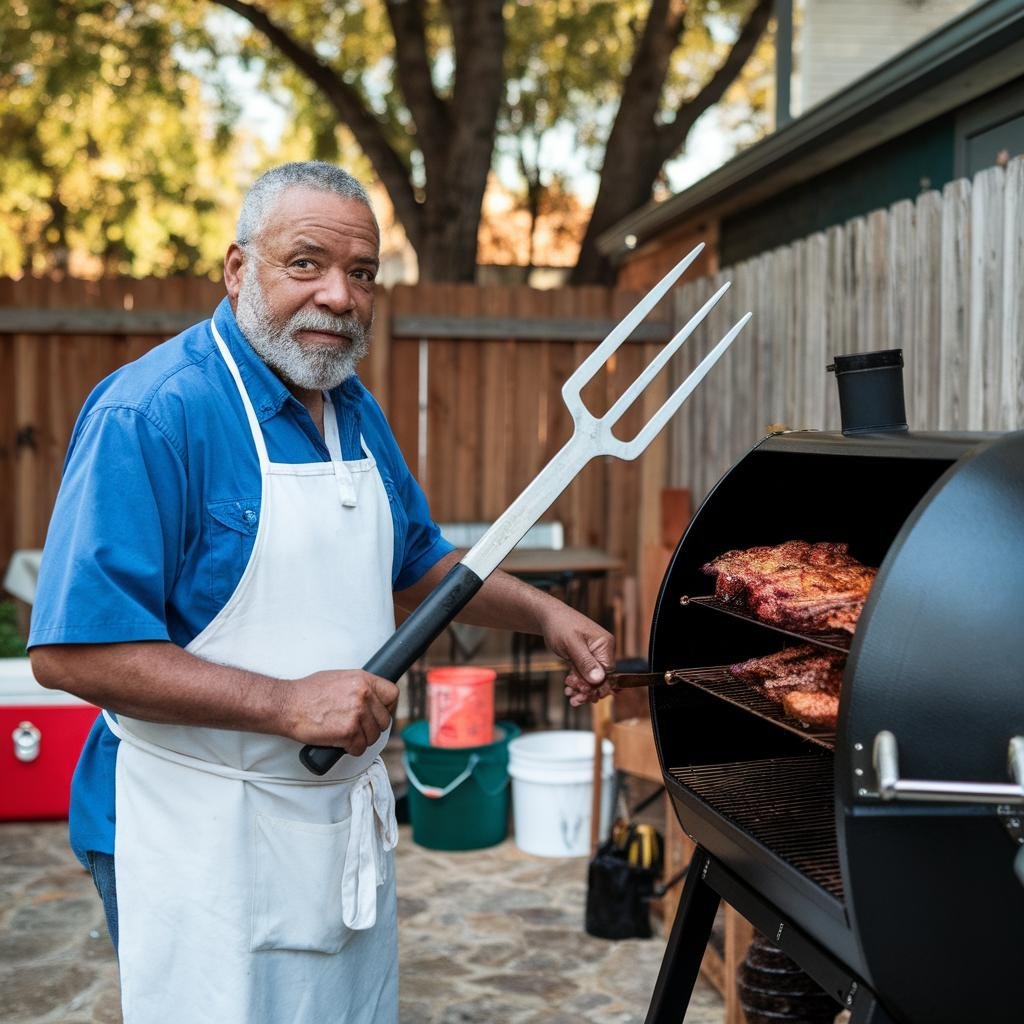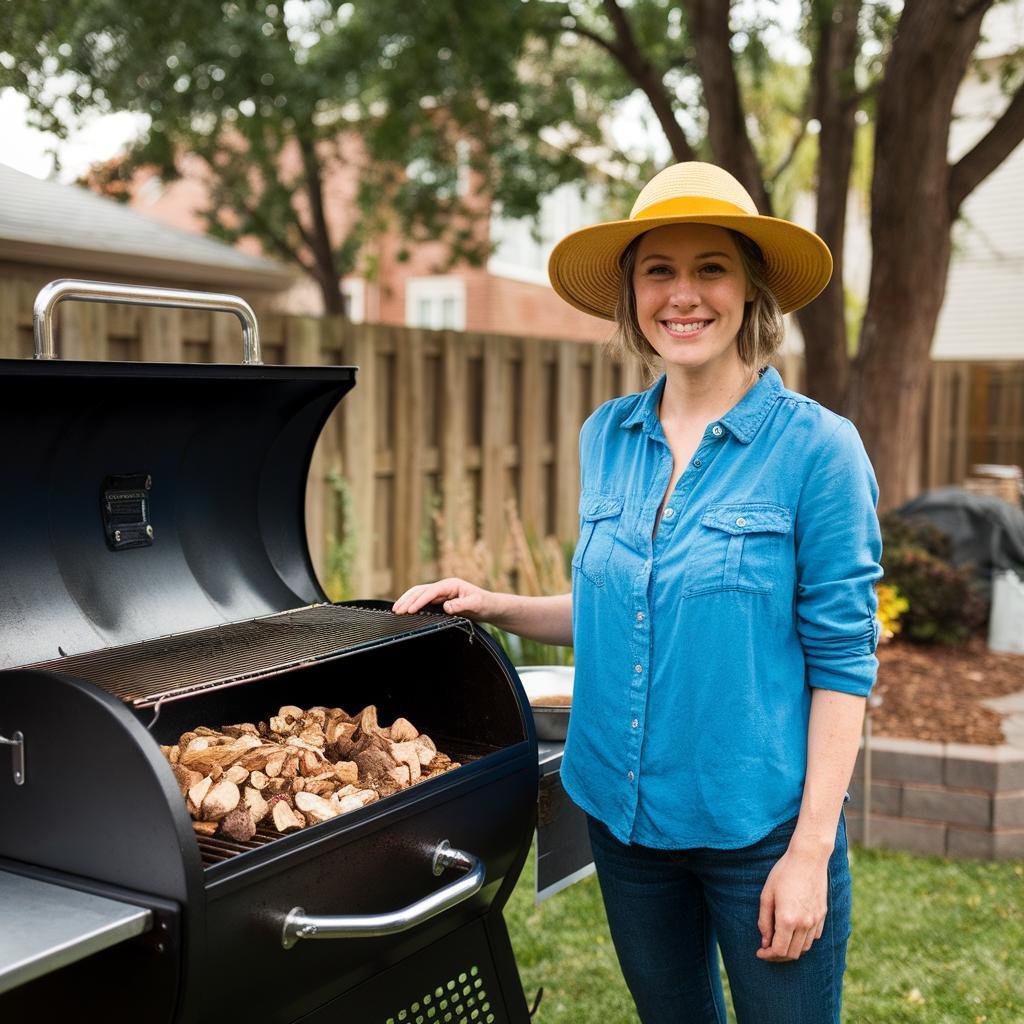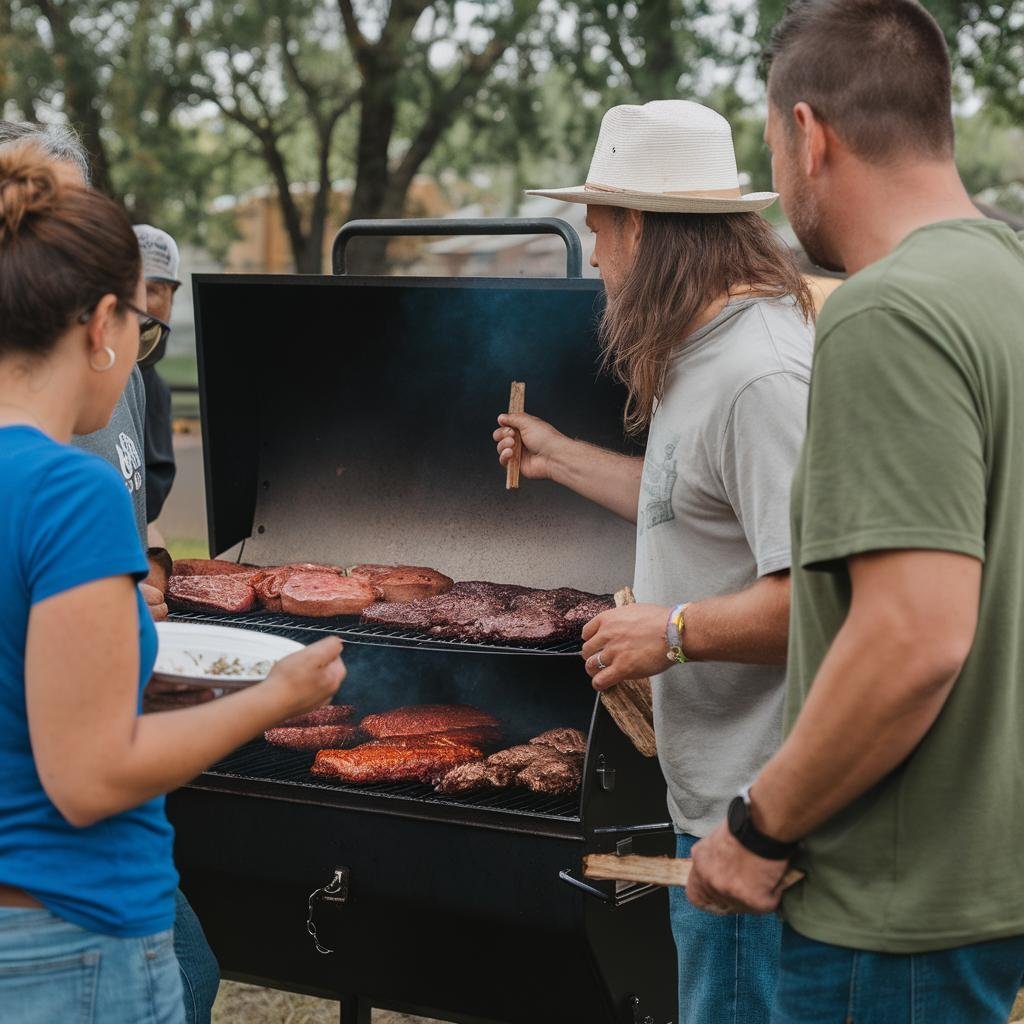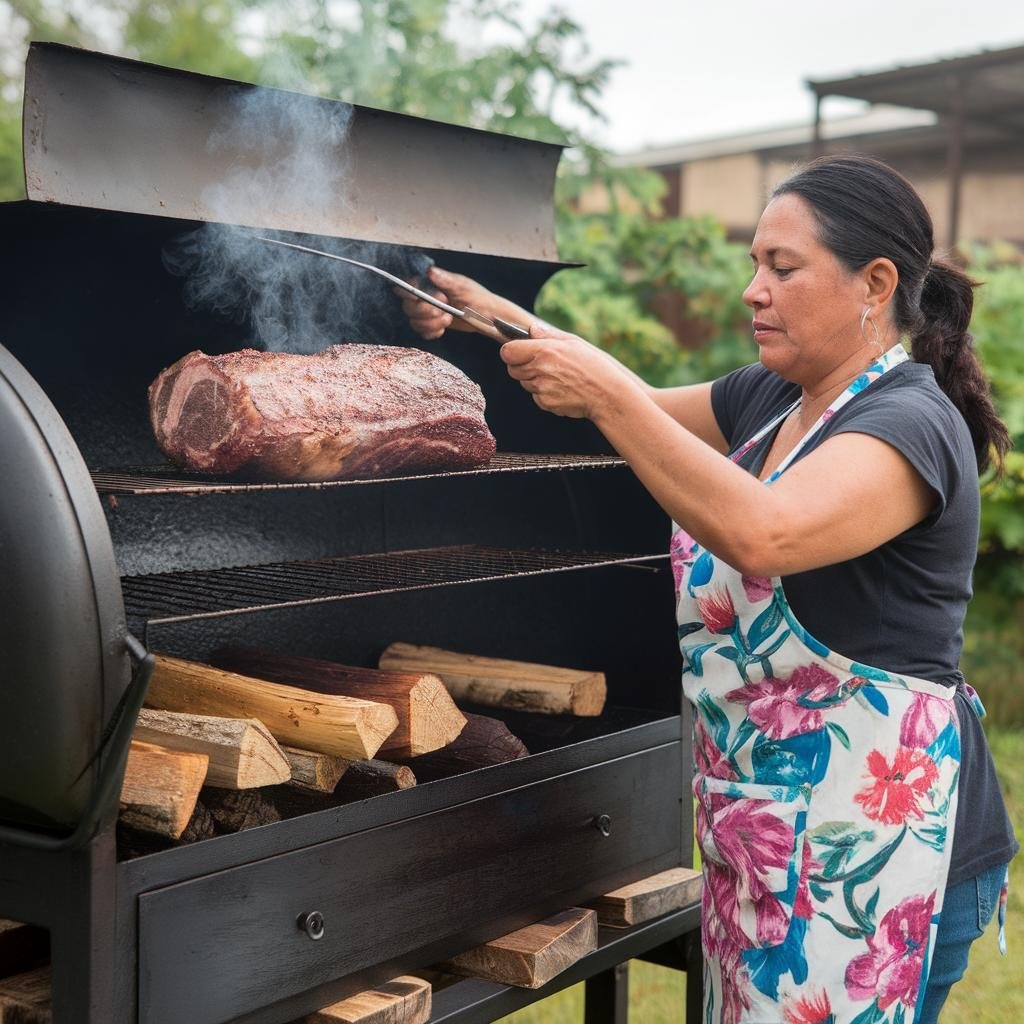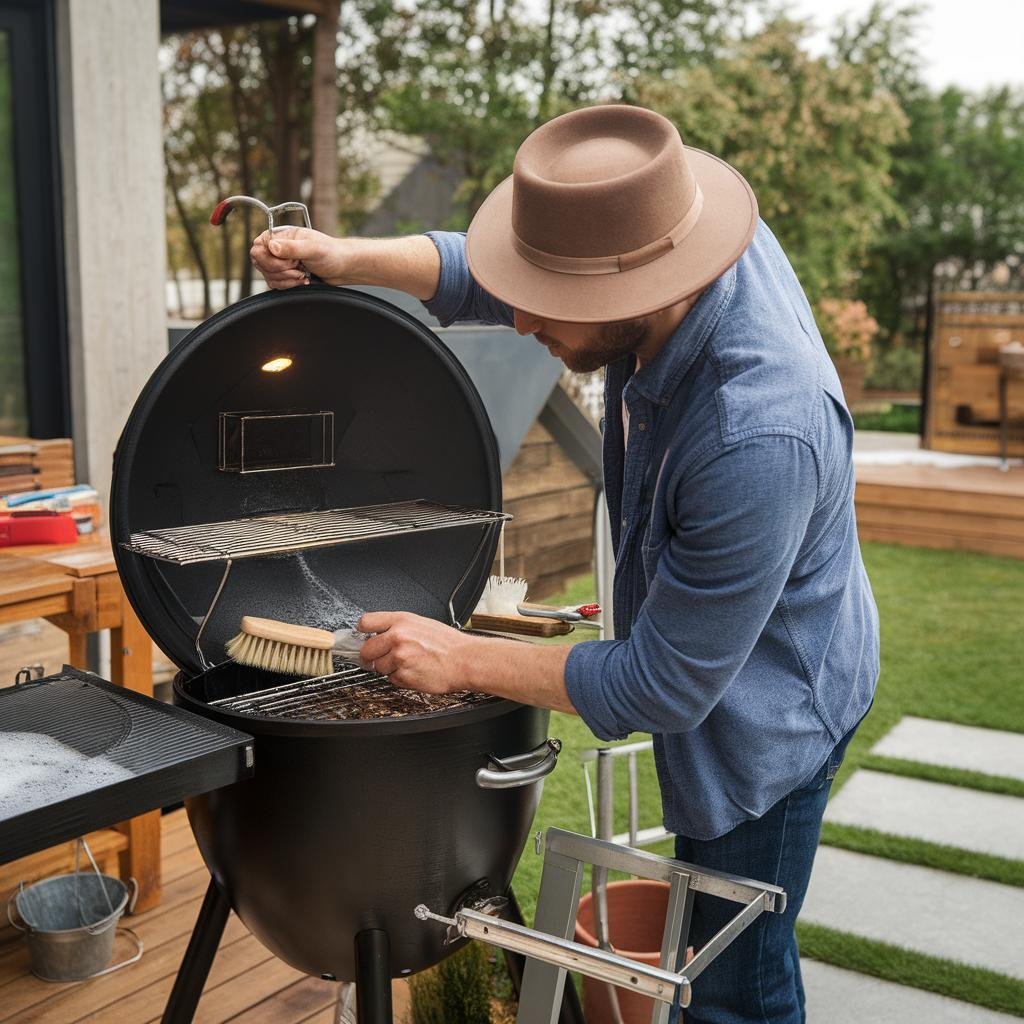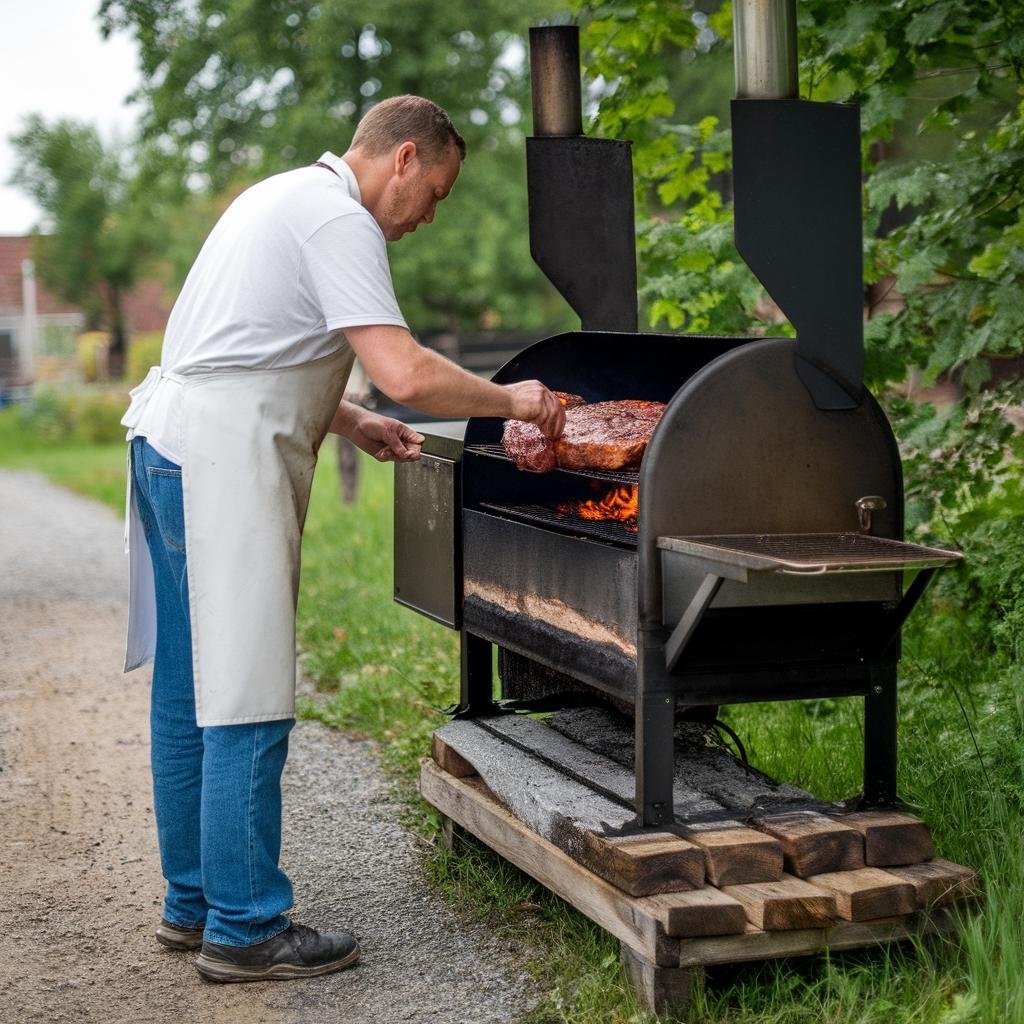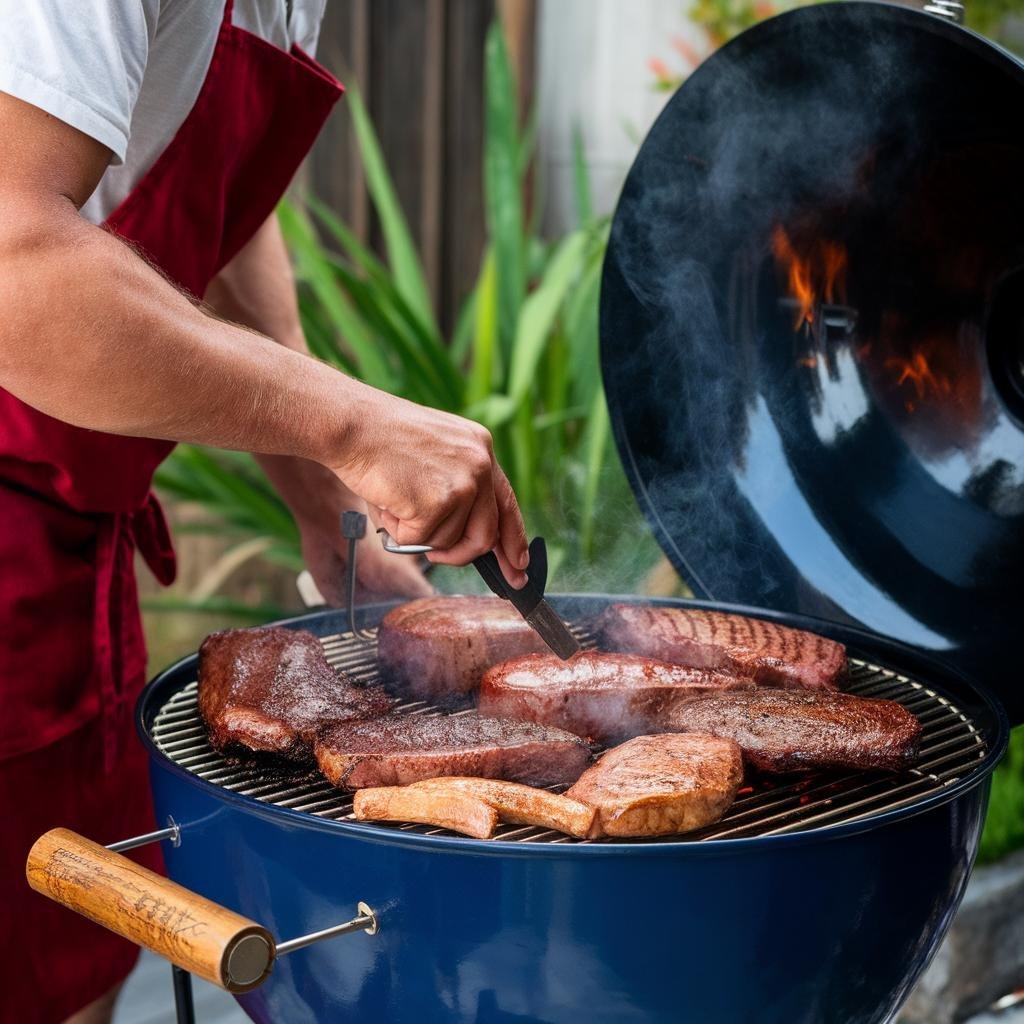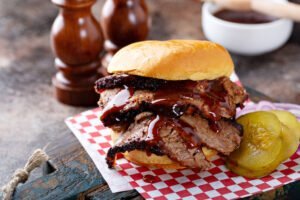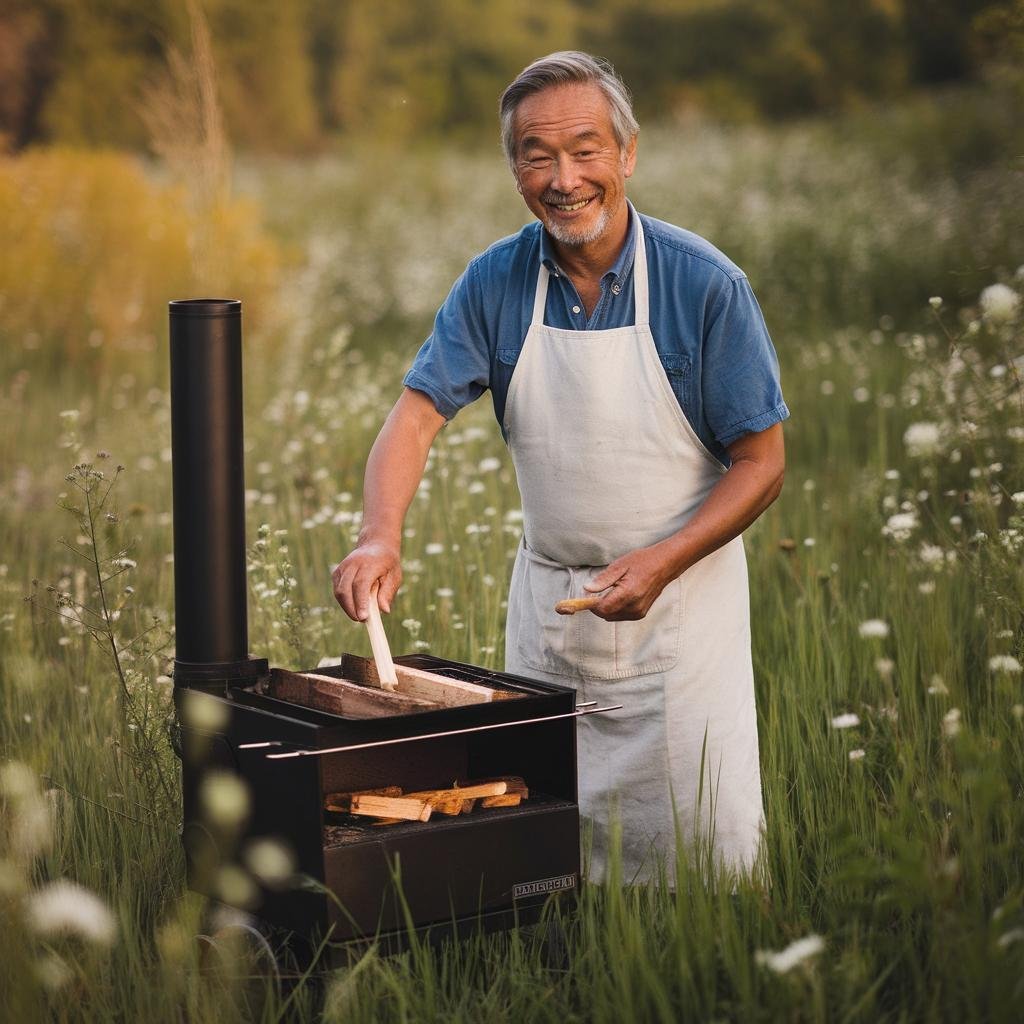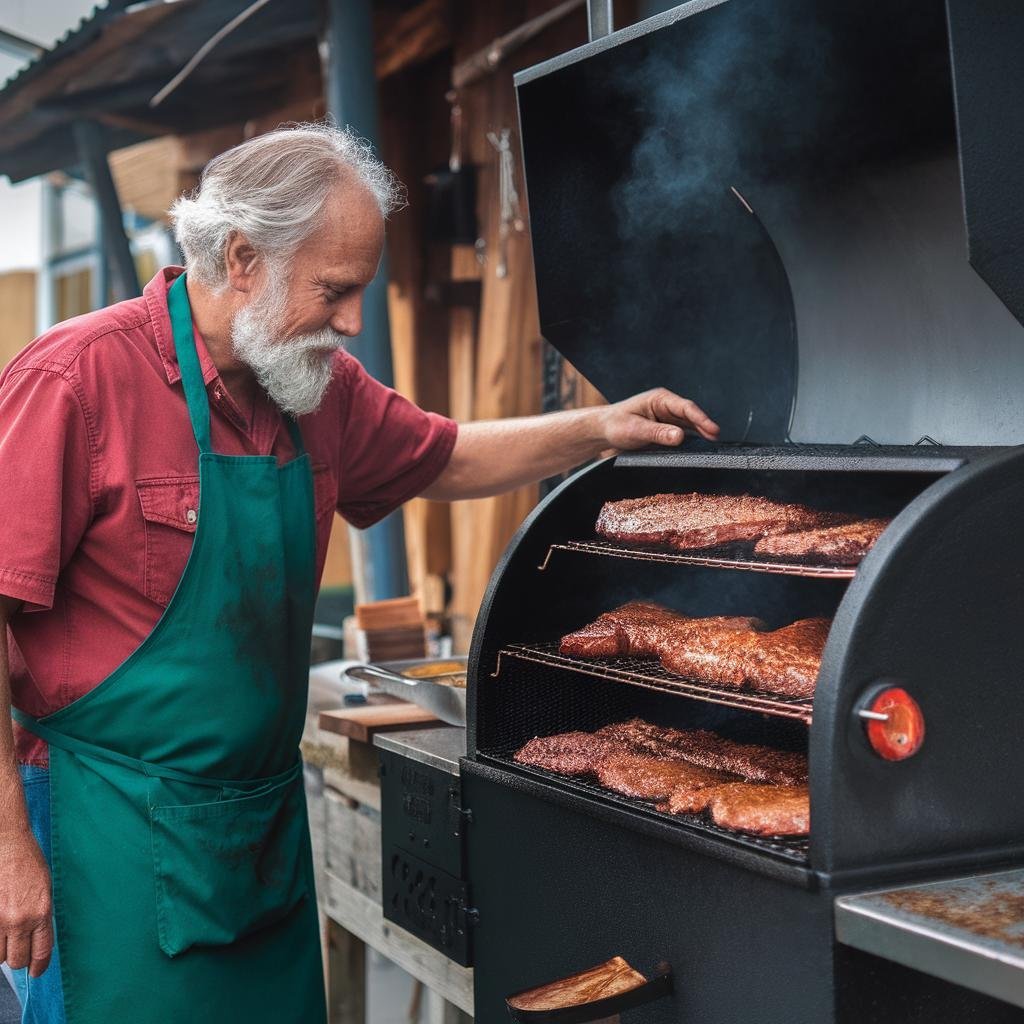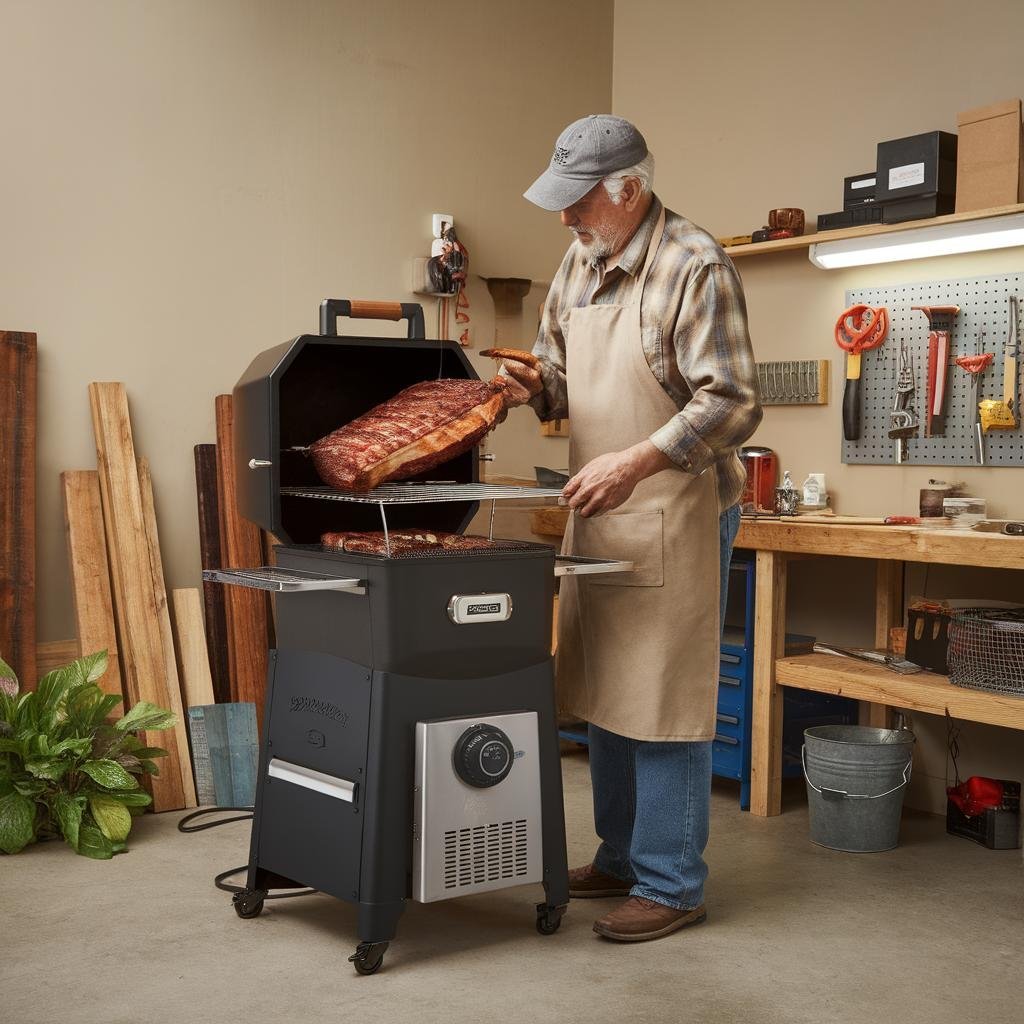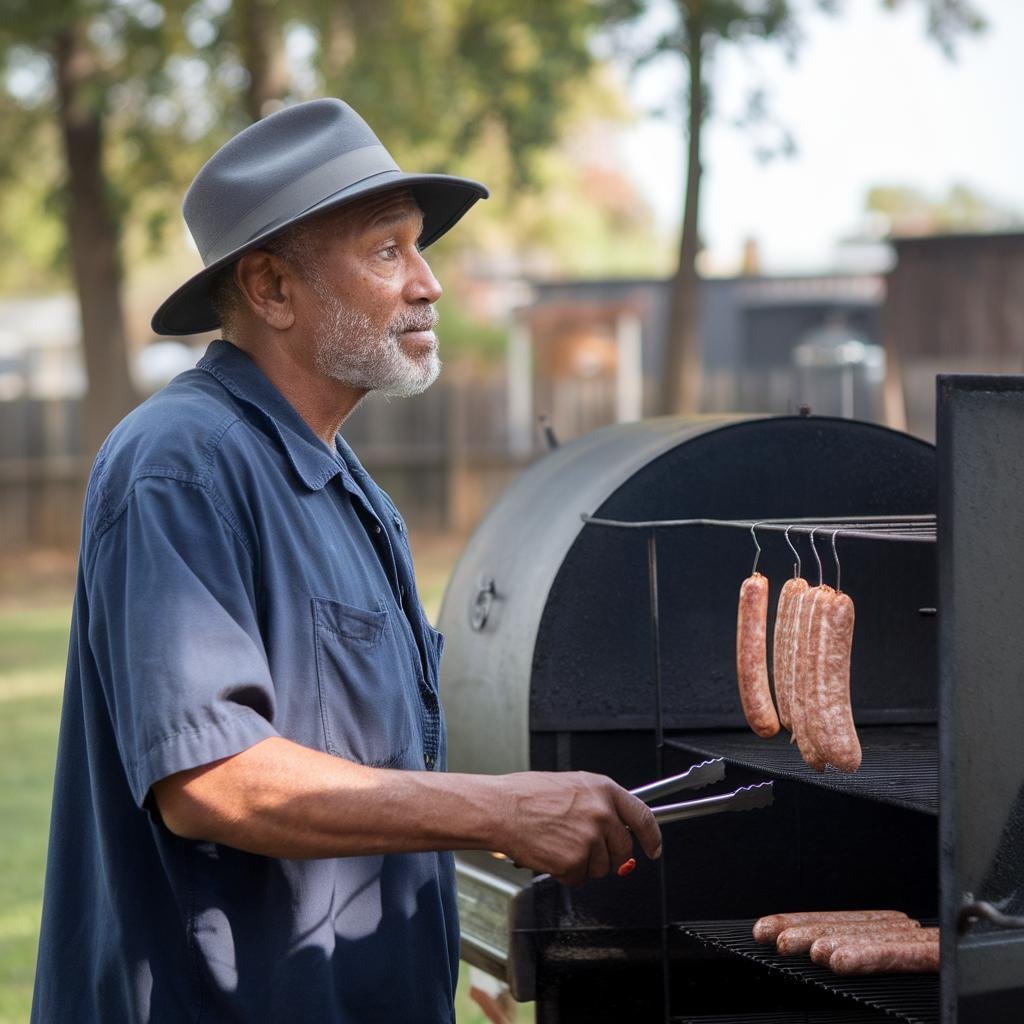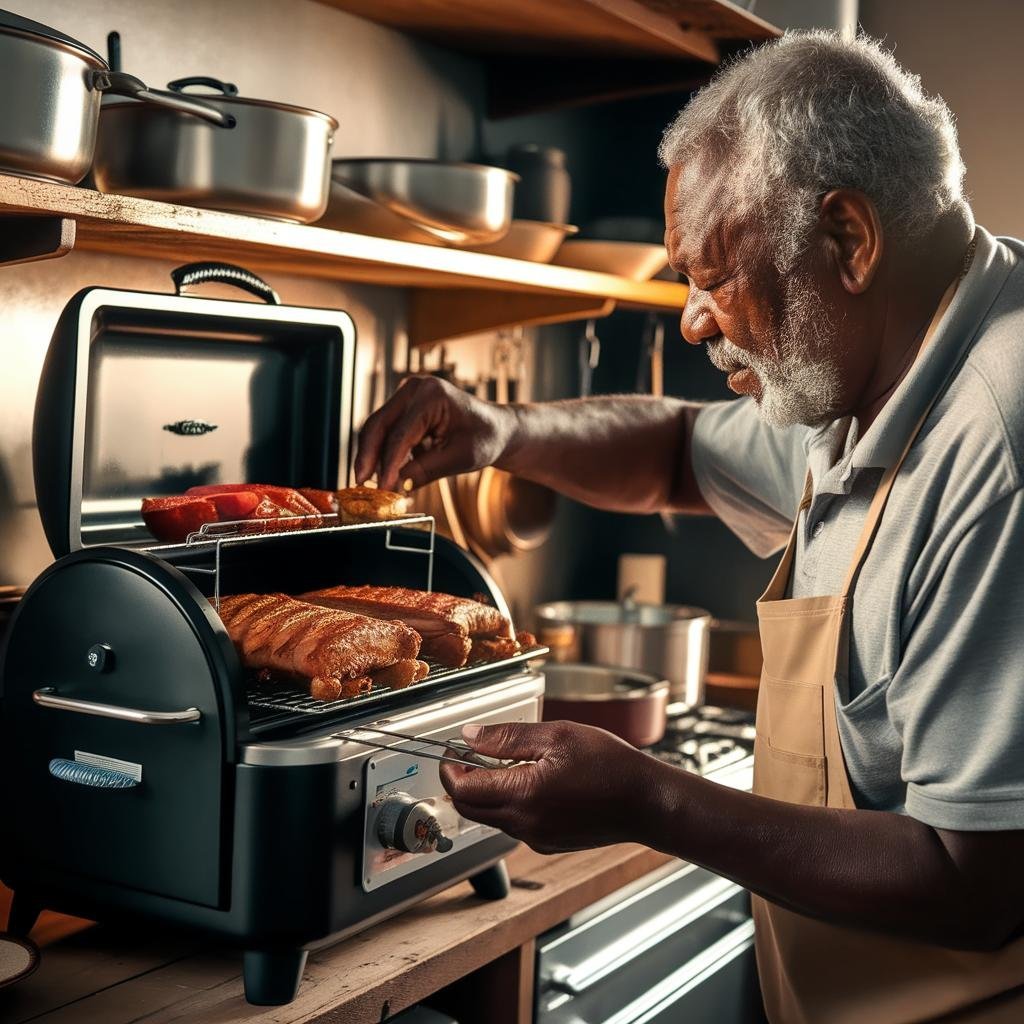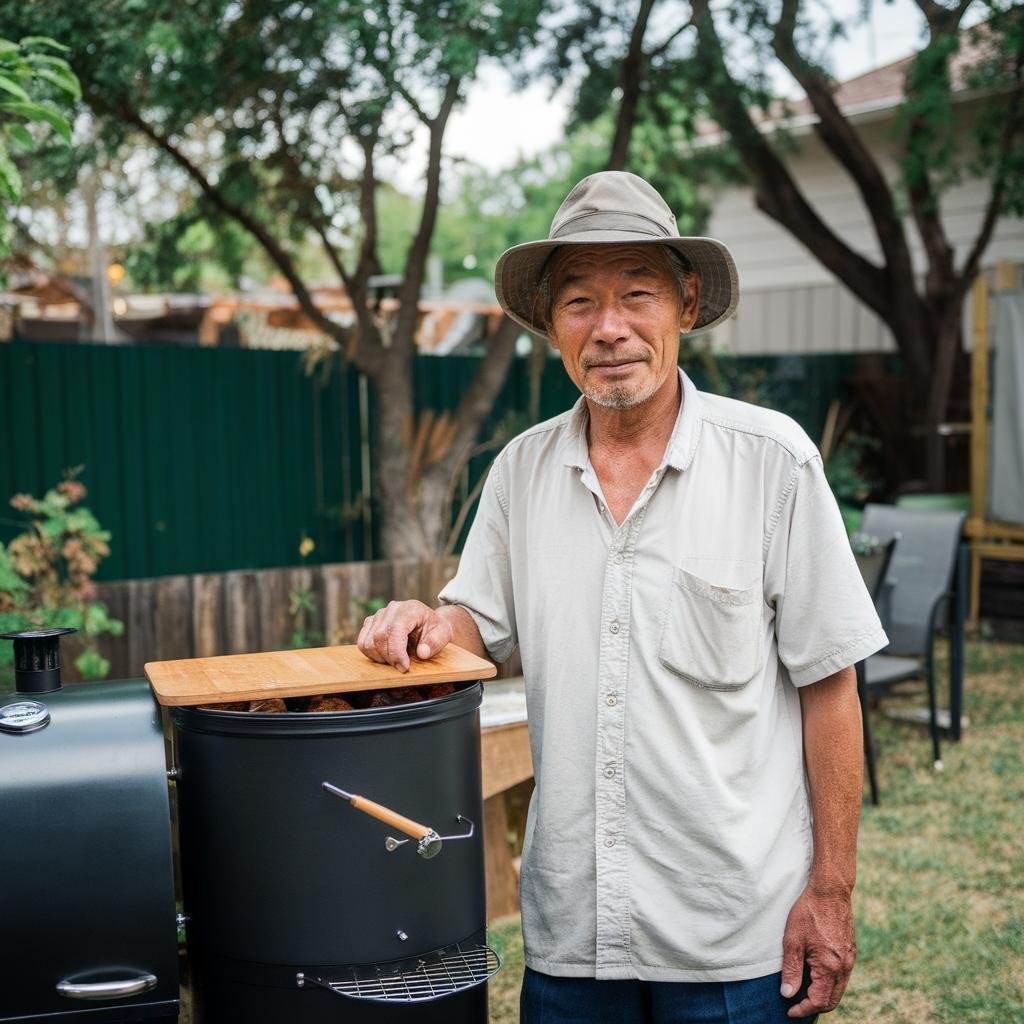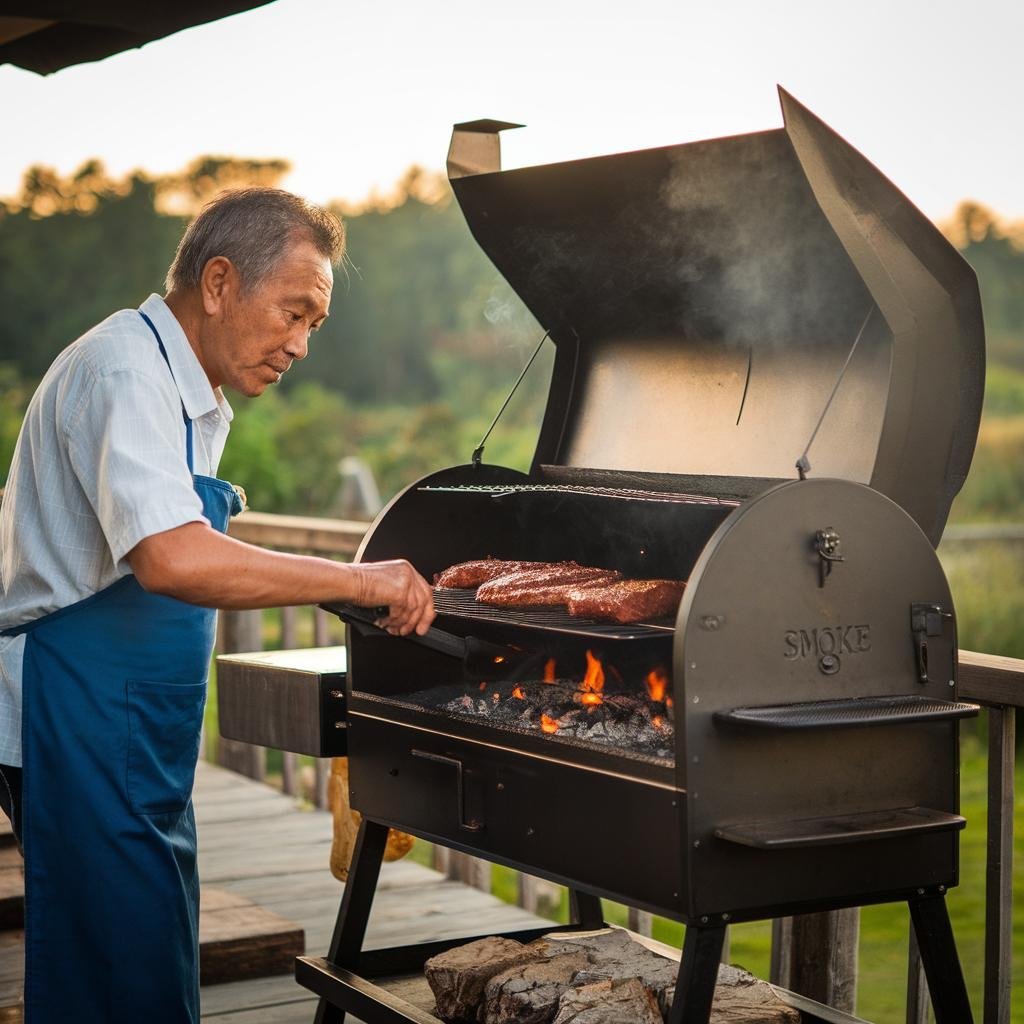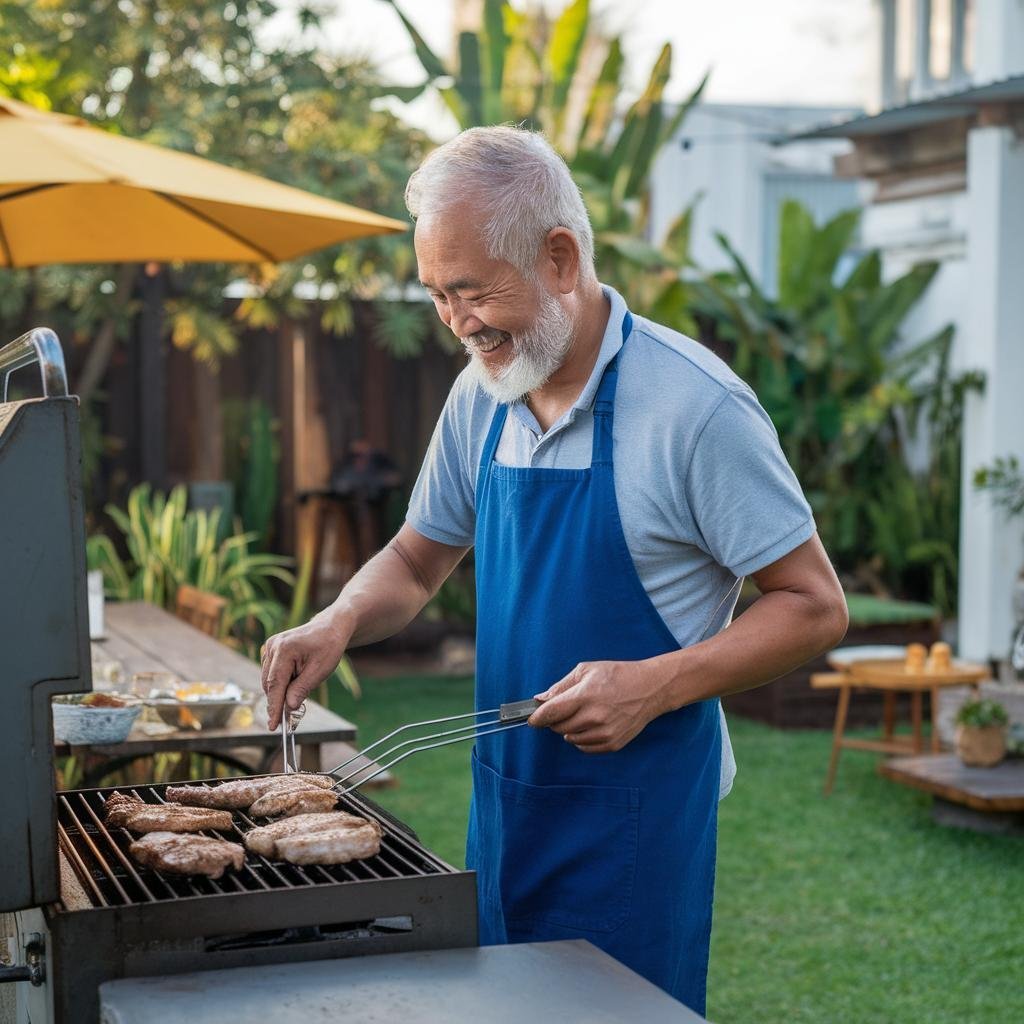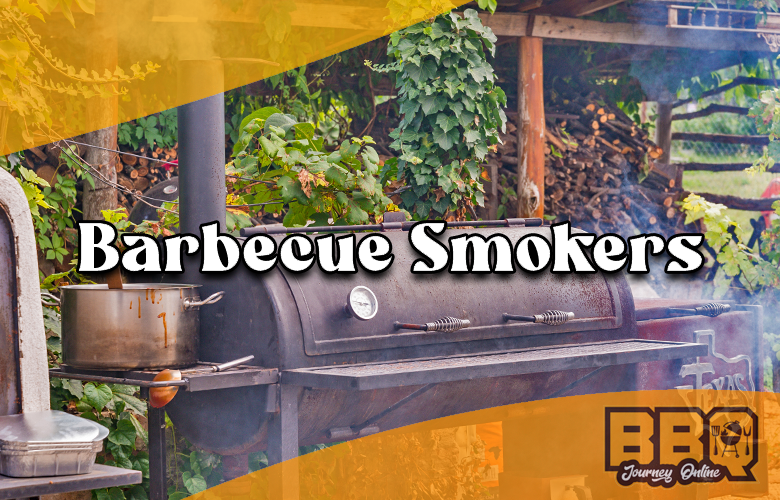
Seize your right to smoke up a storm with the best tools of the trade! Leaving no stone unturned, we’re diving headfirst into the world of smokers-demystifying the complexities, cutting through the jargon, and leading you by the hand right to your ideal match.
This is your go-to guide for everything you need: tips, reviews, and the best types for beginners in 2023.
Has buying a smoker ever seemed daunting?
Worry no more, you’ve landed at the perfect spot. Stay tuned as we fan away the smoke and leave you with an insight so crisp it crackles.
When buying a smoker, it is important to consider factors such as fuel type (wood, charcoal, electricity, wood pellets or gas), cooking capacity, mobility, build quality, ease of use and cleaning.
Additionally, it’s important to consider your personal preferences and needs when choosing between different types of smokers such as freestanding or built-in smokers.
Our comprehensive Smoker Buying Guide covers all of these factors in detail to help you make an informed decision about what smoker is best for you.
Types of BBQ Smokers
When it comes to choosing a BBQ smoker, understanding the different types available is essential in finding the perfect fit for your needs and preferences.
There are various options to consider, each offering its own unique benefits and considerations. Let’s explore some of the most popular types of BBQ smokers.
- Wood Smokers: Wood smokers, also known as stick burners, are traditional and classic choices for smoking meat. These smokers rely on wood as their primary fuel source, which imparts a rich and authentic smoky flavor to the food. Wood smokers require attention and skill to maintain consistent heat and smoke levels. They offer excellent temperature control and versatility in adding different wood flavors by using various types of hardwoods such as hickory, oak, or mesquite.
- Charcoal Smokers: Charcoal smokers are another popular choice among barbecue enthusiasts. These smokers use charcoal briquettes or lump charcoal as their main source of fuel. Charcoal smokers provide a strong smoky flavor to the food while offering better temperature control compared to wood smokers. They require careful monitoring of the charcoal levels and airflow adjustments for maintaining desired cooking temperatures.
- Now that we have explored the general overview of BBQ smoker types let’s take a closer look at wood smokers specifically.
Wood Smokers
Wood smokers, often referred to as stick burners, are prized by many BBQ aficionados for their ability to impart unmatched smoky flavors into the food.
As the name suggests, these smokers rely solely on wood as their fuel source, creating an authentic smoking experience.
One significant advantage of wood smokers is their versatility in using different types of hardwoods for varying flavors.
For example, hickory offers a distinct smoky taste with a hint of sweetness, while mesquite provides a more robust and earthy flavor profile.
Oak, on the other hand, imparts a well-balanced and milder smoky taste.
Imagine slowly smoking a rack of ribs over a bed of hickory wood chips or chunks, allowing the aromatic smoke to penetrate the meat, resulting in tender, flavorful bites that will leave your taste buds craving for more.
While wood smokers offer excellent temperature control, they do require a certain level of skill and attention to maintain consistent heat and smoke levels.
Achieving the ideal temperature can be achieved by carefully managing the airflow within the smoker and adjusting the amount of wood being burned.
It’s imperative to maintain the right balance to avoid temperature fluctuations that may negatively affect cooking results.
While wood smokers provide fantastic flavor and authenticity to your BBQ experience, beginners might find them challenging to master due to their steeper learning curve.
Maintaining proper fuel and smoke levels requires constant monitoring and adjustment.
However, for those willing to invest time and effort into learning the craft, the rewards are well worth it, as wood smokers offer unmatched flavor profiles.
Remember, perfecting the art of using a wood smoker takes patience and practice.
It’s like learning to play a musical instrument; it may be frustrating at first, but with dedication and perseverance, you’ll soon be producing mouth-watering barbecue that friends and family will rave about.
Now that we have gained an understanding of wood smokers, let’s explore other types of BBQ smokers to help you make an informed decision when choosing your preferred smoking method.
Charcoal Smokers
Charcoal smokers have long been a favorite among barbecue enthusiasts due to their ability to impart a delicious smoky flavor to the food.
These smokers utilize charcoal as the primary fuel source, which adds a distinct taste and aroma that many people crave.
One of the advantages of using a charcoal smoker is the high heat they can achieve, allowing for faster cooking times and creating a nice char on the meats.
Additionally, charcoal smokers provide excellent temperature control, giving you the freedom to adjust the heat levels according to your desired cooking style.
Imagine hosting a backyard barbecue where the rich scent of smoldering charcoal fills the air.
The slow burn of the coals produces mouth-watering brisket, ribs, and chicken with an irresistible smoky taste that you can’t help but savor.
The charcoal smoker becomes the centerpiece of your outdoor gatherings, providing not just a means of cooking, but also an experience that brings friends and family together.
However, it’s important to note that charcoal smokers require some skill and practice to operate effectively.
They typically require constant monitoring of fuel and smoke levels to ensure consistent heat and smoke distribution throughout the cooking process.
This level of involvement might be intimidating for beginners or those who prefer a more set-it-and-forget-it approach. Additionally, managing fire and ash cleanup can be messy and time-consuming.
Despite these considerations, charcoal smokers offer a rewarding experience for those who enjoy hands-on cooking and appreciate the authentic smoky flavor that only charcoal can provide.
With proper technique and attention, you can achieve mouthwatering results that will impress even the most discerning barbecue aficionados.
Now let’s explore another popular type of smoker: electric smokers.
- According to the Hearth, Patio & Barbecue Association’s 2022 report, over 40% of BBQ users prefer smokers that are easy to clean and maintain.
- The International Food Information Council (IFIC)’s 2023 Food & Health survey found that nearly 30% of adults who prefer outdoor cooking like BBQ smoking rank flavor as the most important factor when choosing a smoker.
- A 2023 report by Statista U.S. shows that around 20% of American barbeque enthusiasts preferred electric smokers due to their convenience and beginner-friendly properties.
Electric Smokers
Electric smokers are designed with convenience in mind. They are often considered as “set-it-and-forget-it” models due to their ease of use and reliable temperature control.
These smokers rely on electricity to power a heating element, eliminating the need for charcoal or wood as fuel sources.
Electric smokers are equipped with thermostats that allow you to set and maintain a specific cooking temperature effortlessly.
Imagine being able to prepare a delectable smoked salmon dish without the hassle of tending to a fire or monitoring fuel levels.
With an electric smoker, you can achieve consistent results every time, as they offer excellent heat regulation and ample smoke production.
Whether you’re cooking for a small gathering or hosting a larger event, electric smokers provide convenience and peace of mind by taking the guesswork out of temperature control.
While electric smokers simplify the smoking process, there are some trade-offs to consider.
One potential drawback is that these smokers tend to produce less smoke compared to traditional charcoal or wood smokers, which can result in milder flavors.
However, this can be mitigated by using additional smoke-generating devices such as wood chips or pellets.
Additionally, some purists argue that the absence of real fire and traditional fuels diminishes the authenticity and experience of outdoor cooking.
It’s important to note that while electric smokers excel in convenience and ease of use, they may not provide the same level of flavor complexity and depth as other types of smokers.
However, taste preferences vary from person to person, with some individuals valuing convenience over smoky intensity.
Ultimately, choosing an electric smoker depends on your personal cooking preferences and priorities.
Factors to Consider When Purchasing a BBQ Smoker
When it comes to purchasing a BBQ smoker, there are several important factors to consider that will help you make an informed decision.
Each factor plays a crucial role in determining the type of smoker that will best suit your needs and cooking preferences.
Let’s take a closer look at these factors:
Imagine you love the authentic smoky flavor that only charcoal or wood can provide. In that case, you may want to opt for a charcoal or wood smoker.
On the other hand, if convenience and ease of use are your priorities, an electric or gas smoker might be more suitable.
- Fuel Type: There are different fuel types for BBQ smokers: wood, charcoal, electricity, wood pellets, and gas. Each fuel type has its own benefits and considerations. Electric smokers are set-it-and-forget-it models with thermostats that control temperature but can oversmoke food due to minimal airflow. Charcoal smokers offer smoky flavor but have a steeper learning curve. Gas smokers are easy to use with stable heat control, while pellet smokers do everything for you but produce milder flavors.
- Smoker Type: BBQ smokers come in different types, including offset smokers (fire box set off the main chamber), vertical smokers (heat source directly below cooking chamber), and unconventional smokers that don’t fit into traditional categories. The type of smoker you choose depends on your personal preferences and the level of control you want over heat and smoke.
- Mobility: Consider whether you need a freestanding smoker or a built-in one. Freestanding smokers offer mobility, making it easy to move them around, clean them, and store them when not in use. Built-in smokers provide versatility and aesthetic appeal in outdoor kitchens but lack portability.
- Cooking Capacity: Assess your cooking needs based on the number of people you typically cook for. Smokers come in various sizes, from small portable ones suitable for a couple of people to larger ones that can handle big gatherings or events. Choose a smoker that offers enough cooking space to meet your requirements.
- Quality and Features: The quality and performance of the smoker are essential factors to consider. Look for durable construction, proper insulation, and a reliable temperature control system. Additional features such as built-in thermometers, multiple racks, and easy-clean grates can enhance your smoking experience.
Now that we have discussed the factors to consider when purchasing a BBQ smoker, let’s move on to one of the most crucial aspects: budget.
- When buying a BBQ smoker, it is important to consider factors such as fuel type, smoker type, mobility, cooking capacity, and quality/features. Each factor plays a crucial role in determining the type of smoker that will best suit your needs and cooking preferences. Additionally, it is essential to assess your budget and invest in a high-quality smoker with durable construction, proper insulation, and reliable temperature control system to enhance your smoking experience.
Budget
Setting a budget is an important step in the process of purchasing a BBQ smoker. The price range for smokers can vary significantly depending on the type, size, brand, and additional features.
It’s essential to determine how much you are willing to invest in a smoker before beginning your search.
Let’s say you’re just starting out as a barbecue enthusiast and don’t want to splurge on an expensive smoker right away.
In that case, you might opt for a more budget-friendly option that still provides good performance and reliability.
Consider the following points when determining your budget:
- Entry-Level Smokers: If you are new to smoking and want to get started without breaking the bank, entry-level smokers like charcoal gravity smokers or smaller electric models are great options. These smokers offer decent performance at affordable prices, allowing you to learn the basics of smoking before investing in more advanced equipment.
- Mid-Range Smokers: If you have some experience with smoking and are looking for better temperature control and durability, consider mid-range smokers in the $300-$600 price range. These smokers often offer better insulation, adjustable vents, and larger cooking capacities compared to entry-level models.
- High-End Smokers: For serious barbecue enthusiasts or professionals who prioritize advanced features, durability, and excellent temperature control, high-end smokers ranging from $800 and beyond might be the right choice. These smokers often come with additional bells and whistles such as Wi-Fi connectivity, precise temperature controls, and larger cooking capacities.
- Consider Long-Term Value: When determining your budget, it’s crucial to think about long-term value rather than just the upfront cost. Some higher-priced smokers offer better build quality, longer lifespan, and warranties that can save you money in the long run.
Keep in mind that while a higher budget may provide access to more advanced features and better quality, it doesn’t necessarily mean you won’t find a suitable smoker within a lower price range.
It all comes down to understanding your cooking needs and finding a smoker that meets those requirements within your allocated budget.
Think of your budget like setting limits for yourself at a buffet – you want to enjoy a variety of flavors without overspending or limiting your options too much.
Desired Flavor Profile
When it comes to BBQ smoking, one of the most crucial factors to consider is the desired flavor profile.
Different fuel types for BBQ smokers, such as wood, charcoal, electricity, wood pellets, and gas, each have their own benefits and considerations.
If you enjoy that classic smoky aroma and robust flavors, then wood or charcoal smokers might be the way to go.
Charcoal smokers offer a steeper learning curve but provide that authentic smoky flavor enthusiasts seek.
With these smokers, you’ll need to constantly monitor fuel and smoke levels. Adding wood chips or chunks can also intensify the smoky flavor.
On the other hand, if you prefer convenience and ease of use, electric smokers may be more suitable for your needs.
These set-it-and-forget-it models come with thermostats that control temperature, making them beginner-friendly.
However, be aware that electric smokers tend to oversmoke food due to minimal airflow.
Gas smokers offer a balance between convenience and flavor. They are easy to use and provide stable heat with a gas burner in the smoking chamber.
Temperature and smoke control are generally easier compared to wood or charcoal smokers.
For those who prioritize mild and subtle flavors in their BBQ dishes, pellet smokers are an excellent choice.
These all-in-one smokers manage fuel and heat levels while regulating smoke and airflow automatically.
Pellet smokers produce consistent results but may not deliver the intense smokiness that traditional wood or charcoal smokers provide.
Ultimately, the best smoker for you will depend on your personal preference for flavor profiles.
Consider your desired taste experience when selecting the type of smoker that aligns with your barbecue goals.
Key Features of the Best Smokers
Now that we have discussed the importance of flavor profile in choosing a smoker, let’s delve into the key features to look for when selecting the best smoker for your needs.
- Temperature Control: A top-notch smoker should offer precise temperature control. This is especially important for achieving consistent results and cooking meat to perfection. Look for a smoker with a reliable thermostat or temperature control mechanism.
- Build Quality and Durability: Investing in a well-built smoker that can withstand the test of time is crucial. Consider materials like stainless steel or heavy-duty ceramic for durability. A sturdy construction ensures longevity and endurance against harsh weather conditions.
- Size and Cooking Capacity: Consider the size of the smoker and its cooking capacity based on your needs. If you frequently entertain large groups or plan to cook larger cuts of meat, opt for a smoker with ample cooking space to accommodate your requirements.
- Heat Distribution: Even heat distribution is essential for even cooking throughout the smoking process. Look for smokers that offer features such as multiple vents, baffles, or an offset firebox that ensure consistent heat distribution and minimize hot spots.
- Ease of Use and Cleaning: Choose a smoker that is user-friendly, with clear instructions and intuitive controls. Additionally, look for models that are easy to clean, as this will save you time and effort in maintenance.
- Portability and Storage Options: Consider whether you need a freestanding BBQ smoker for mobility, easier cleaning, and storage, or if a built-in smoker would provide the versatility and aesthetic appeal desired in outdoor kitchens.
- Quality and Performance: Research different brands and models to find ones known for their quality craftsmanship and performance. Reading reviews from other users can provide valuable insights into the reliability and functionality of different smokers.
By considering these key features when purchasing a smoker, you can ensure that you select one that suits your specific needs and preferences.
Material and Durability
When it comes to purchasing a BBQ smoker, considering the material and durability is of utmost importance.
You want a smoker that can withstand the elements and last for years to come.
The most common materials used for smokers are steel, ceramic, and cast iron.
Steel smokers are popular due to their durability and heat retention capabilities.
They are often coated with high-temperature paint or powder coating to protect against rust and corrosion.
Stainless steel smokers offer even greater resistance to rust but tend to be more expensive.
Ceramic smokers, like Kamado Joe, are known for their excellent heat retention properties.
The thick ceramic walls trap heat inside the cooking chamber, allowing for efficient cooking at various temperatures.
While they are more fragile than steel smokers, proper care can ensure their longevity.
Cast iron smokers provide exceptional heat retention, making them ideal for slow cooking methods.
However, they require regular maintenance to prevent rusting.
One factor to consider when evaluating the durability of a smoker is its thickness.
A thicker material tends to retain heat better, resulting in consistent cooking temperatures.
It’s important to note that thicker materials also contribute to the overall weight of the smoker, which may impact portability if that is a priority for you.
Keep in mind that factors such as build quality and craftsmanship also influence the lifespan of a smoker.
Reading customer reviews and researching reputable brands can help you make an informed decision about the material and durability of your chosen smoker.
Heat Control and Stability
Achieving precise temperature control is crucial for successful smoking. Different types of smokers offer varying degrees of heat control and stability.
Charcoal smokers provide traditional flavor and the ability to adjust temperature by adjusting airflow through vents.
However, maintaining stable temperatures can be challenging due to fluctuations caused by wind or weather conditions.
Using a water pan or diffuser plate can help regulate heat distribution.
Electric smokers offer precise temperature control with thermostats, making them ideal for beginners.
They eliminate the need to monitor fuel levels and adjust vents, allowing you to set it and forget it.
However, limited airflow in electric smokers can lead to oversmoking.
Gas smokers are convenient and easy to use, thanks to their adjustable gas burners. They offer stable heat control and provide consistent cooking temperatures.
The ability to regulate both temperature and smoke production makes them a popular choice for many BBQ enthusiasts.
Pellet smokers are known for their versatility and automated temperature control. They use wood pellets as fuel, which are fed into the firepot by an auger system.
Advanced models come with digital controllers that allow you to set and maintain specific temperatures throughout the cooking process.
Consider your cooking preferences and experience level when choosing a smoker with the right heat control and stability features.
If you enjoy being involved in every step of the smoking process and don’t mind spending time adjusting vents or adding fuel, a charcoal smoker might be suitable for you.
On the other hand, if convenience and ease of use are essential, an electric or gas smoker may be more suitable.
For instance, if you prioritize flavor but also desire convenience, a pellet smoker like Yoder or Recteq could be an excellent choice.
These smokers combine the benefits of pellet fuel (convenient and automated) with precise temperature control for a consistent cook every time.
Remember, each type of smoker offers its own advantages and considerations regarding heat control and stability.
Understanding your needs and preferences will help guide you toward selecting the best option.
Major BBQ Smoker Brands
When it comes to choosing a BBQ smoker, there are several reputable brands that have established themselves as leaders in the industry.
These brands have earned their reputation through years of experience, quality craftsmanship, and consistently delivering exceptional results.
Let’s take a closer look at some of the major BBQ smoker brands that you should consider when making your purchase.
One of the highly regarded brands in the BBQ smoker market is Yoder.
Yoder smokers are known for their durability, precision engineering, and versatile cooking capabilities. They offer a range of different models to suit various needs, from small backyard cookouts to large-scale gatherings.
Yoder smokers are often praised for their excellent temperature control, allowing users to maintain consistent heat throughout the smoking process.
Whether you’re a seasoned barbecue enthusiast or just starting out, Yoder offers smokers that can cater to your specific preferences and requirements.
Another brand that has gained significant popularity is Recteq.
Recteq smokers are renowned for their pellet grills, which provide convenience and ease of use without compromising on flavor. Pellet smokers utilize wood pellets as a fuel source, offering consistent heat and imparting rich smoky flavors to your food.
Recteq’s pellet smokers not only excel in performance but also boast advanced features such as precise temperature control, WiFi connectivity for remote monitoring and control, and spacious cooking areas.
With a Recteq pellet smoker, you can enjoy the benefits of traditional smoking techniques with modern technology at your fingertips.
While Yoder and Recteq are exceptional choices for BBQ smokers, it’s important to remember that there are other notable brands available as well.
Each brand may have its unique selling points and features that cater to different preferences and budgets.
It’s advisable to thoroughly research and compare different options before making your final decision.
Now that we’ve explored some major BBQ smoker brands, let’s dive deeper into the world of pellet smokers and two popular options – Yoder and Recteq.
Pellet Smokers: Yoder and Recteq
Pellet smokers have gained immense popularity in recent years due to their convenience, versatility, and ability to deliver delicious smoked flavors.
Among pellet smoker enthusiasts, Yoder and Recteq are often recognized as top contenders in this space.
Yoder’s line of pellet smokers is known for their exceptional build quality and robust construction. Their smokers are made from heavy-duty materials that ensure durability and longevity.
Yoder offers a wide range of models, varying in size and capacity to meet the needs of different users.
Whether you’re cooking for a small gathering or hosting a large party, Yoder has a pellet smoker that can accommodate your requirements.
Additionally, Yoder smokers provide precise temperature control and even heat distribution, allowing you to achieve consistent results with every cook.
They are also praised for their spacious cooking areas, enabling you to smoke multiple dishes simultaneously.
On the other hand, Recteq has earned a loyal following for their innovative features and technological advancements.
Their pellet smokers come equipped with smart controllers that allow you to monitor and adjust temperatures remotely using WiFi connectivity.
This feature is particularly convenient when you’re entertaining guests or need to step away from the grill temporarily. Recteq smokers also offer large cooking surfaces, enabling you to prepare generous portions of food at once.
With their precise temperature control systems, you can rest assured that your food will be cooked to perfection every time.
For instance, imagine hosting a backyard barbecue party where you’re smoking ribs on a Recteq pellet smoker.
With its WiFi connectivity, you can effortlessly monitor the temperature from inside your home while mingling with guests.
The result? Tender, smoky ribs that impress everyone at the party.
Both Yoder and Recteq offer exceptional quality and performance in their respective pellet smokers.
Your choice ultimately boils down to personal preferences such as budget, cooking capacity, technological features, and specific needs.
It’s recommended to read customer reviews, compare specifications, and even reach out to experienced BBQ enthusiasts for their insights before making a final decision.
Ceramic Smokers: Kamado Joe & Big Green Egg
When it comes to ceramic smokers, two popular options that often come up are the Kamado Joe and the Big Green Egg.
These versatile cooking devices have gained a loyal following among barbecue enthusiasts for their exceptional heat retention and ability to produce deliciously smoky flavors.
The Kamado Joe is known for its superior build quality and thoughtful design features. It comes in various sizes, allowing you to choose one that suits your cooking needs.
The ceramic construction of the Kamado Joe ensures excellent insulation properties, making it efficient in maintaining consistent temperatures over long periods.
Whether you’re grilling, smoking, or even baking, the Kamado Joe provides precise temperature control with easy-to-use vents and a reliable thermometer.
Similarly, the Big Green Egg has also earned a strong reputation in the world of ceramic smokers.
With its iconic egg-shaped design, it offers versatility in cooking methods and temperature control.
The thick ceramic walls of the Big Green Egg contribute to its impressive heat retention capabilities, allowing for longer cook times without constantly adding fuel.
It comes in different sizes as well, catering to various cooking requirements.
Both the Kamado Joe and the Big Green Egg are highly regarded for their ability to generate intense heat and hold it steadily for hours.
The ceramics used in their construction are capable of reaching high temperatures quickly while also distributing heat evenly throughout the cooking chamber.
This allows for consistent results across your food, ensuring juicy meats with a flavorful smoke profile.
One advantage of ceramic smokers like these is their fuel efficiency. Due to their superior insulation, they require minimal fuel to maintain desired temperatures, making them great options for prolonged smoking sessions without constantly refueling.
Imagine preparing a mouthwatering brisket on a hot summer day using one of these ceramic smokers.
As you carefully monitor the temperature gauge and adjust the vents according to your desired airflow, you can rest assured that your meat is cooking evenly and absorbing the smoky flavor imparted by the quality charcoal or wood chunks you’ve chosen.
The ceramic walls of the smoker trap the heat inside, creating a controlled environment perfect for low-and-slow cooking.
It’s worth mentioning that while both Kamado Joe and Big Green Egg offer exceptional performance, some enthusiasts have their preferences.
Whether it’s based on personal experience or the specific features that each brand offers, there can be passionate debates among barbecue aficionados about which one reigns supreme.
Some argue that the Kamado Joe edges out the Big Green Egg with its innovative Divide & Conquer cooking system, which allows for various cooking configurations simultaneously.
Others swear by the Big Green Egg’s reputation as one of the pioneers in ceramic smokers, emphasizing its durability and longevity.
Ultimately, the choice between these two stellar options may come down to personal preference and specific needs.
Regardless of which ceramic smoker you choose, be it the Kamado Joe or the Big Green Egg, you’re embarking on a journey of delicious smoked meats and unforgettable outdoor cooking experiences.
Both these grills have proven themselves time and again as reliable companions for backyard barbecues and culinary adventures.
So, whether you’re a seasoned pitmaster looking to upgrade your smoking game or a beginner eager to explore the world of barbecue, consider adding a ceramic smoker like the Kamado Joe or the Big Green Egg to your collection.
With their impressive performance and versatility, these two brands are sure to elevate your outdoor cooking endeavors to new heights. Happy smoking!
Barbecue Smoker FAQ
What features should I look for in a beginner-friendly smoker?
When looking for a beginner-friendly smoker, it’s important to consider certain features that can enhance your smoking experience. Firstly, opt for a smoker with precise temperature control, as this will help you maintain consistent heat levels. Additionally, choose a smoker with sufficient cooking space to accommodate your needs. Finally, look for a smoker that offers ease of use and cleaning, preferably one with simple controls and removable grates or trays. According to a survey conducted by BBQ Guru in 2022, 78% of beginner smokers found these features crucial in their purchase decision.
What type of wood chips produce the best flavor for smoked meats?
The type of wood chips that produce the best flavor for smoked meats depends on personal preference, but some popular choices are hickory, apple, and mesquite. Hickory offers a strong and rich flavor, perfect for beef and pork. Apple wood gives a subtle sweet and fruity taste, great for poultry and pork. Mesquite imparts a bold and intense smoky flavor, ideal for red meats like beef and lamb. Ultimately, it’s about experimenting to find the flavor profile that suits your taste buds and the meat you’re smoking.
What is the difference between a gas smoker and an electric smoker?
The main difference between a gas smoker and an electric smoker lies in their fuel source and temperature control. Gas smokers, powered by propane or natural gas, offer greater mobility and faster preheating times. On the other hand, electric smokers provide consistent heat and convenient temperature adjustment with fewer chances of flare-ups. According to a consumer survey conducted in 2022, 55% of barbecue enthusiasts preferred electric smokers due to their ease of use and precise temperature control, while 45% favored the portability and quick setup of gas smokers. Ultimately, the choice between the two depends on personal preferences and priorities in terms of convenience and flavor.
How do I properly maintain and clean my smoker for optimal performance?
To properly maintain and clean your smoker for optimal performance, there are a few key steps to follow. First, make sure to clean the grates and racks after each use to prevent buildup of grease and debris. Use a wire brush or scraper to remove any stuck-on residue. Secondly, regularly clean the interior walls and ceiling of the smoker using a mixture of water and mild detergent. This helps to prevent the accumulation of smoke residue, which can affect the flavor of your food. Lastly, inspect and clean the burner or heating element periodically to ensure it is functioning efficiently. By maintaining cleanliness and regular inspections, you can prolong the lifespan of your smoker while achieving consistent and delicious smoky flavors. According to a survey conducted by Grilling.com, 87% of experienced smokers found that regular cleaning significantly improved the performance of their smokers.
How much should I expect to spend on a high-quality smoker?
The price range for high-quality smokers can vary, but on average, you should expect to spend anywhere between $300 to $1000. The cost will depend on factors like the type of smoker (electric, charcoal, pellet), the material used, size, and additional features. According to a study conducted by AmazingRibs.com, the median price of top-rated smokers is around $500. However, it’s important to consider your individual needs and budget before making a purchase.
